#it's also not a thing in this particular fantasy historical china but they do it anyway
Text
okay i like the 'wei wuxian is adopted' jokes as much as anybody, but i do see people taking that premise seriously and like
it's kind of pivotal to the narrative that he wasn't, actually?
adoption is, within the setting, a specific, deliberate process with legal repercussions. people can be formally adopted. that exists. he was not.
adopted wei wuxian would have been in a vastly more secure situation; his ambiguous hovering position where he's simultaneously a nobody-orphan with no formal connections and part of the upper echelon of society is definitional. it's what allowed things to fall out the exact way they did.
adopted wei wuxian could not have walked away from jiang sect so easily; he would have been jiang wuxian. adopted wei wuxian would have been a sect leader candidate, when jiang cheng was out of the running because of wen zhuliu. adopted wei wuxian would have had actual status.
the fact that he's their brother but not on paper drives a significant amount of his jiang-sibling-related plotlines!
adoption would have made a huge difference at a whole bunch of junctures, and it was technically an option on the table that was not taken.
i bring this up for a lot of reasons but also because like. adoption and marriage have a lot in common, as formalized transfers of someone into a family.
there were good reasons for wei wuxian to not get adopted! (also shitty reasons that nevertheless presented valid constraints.)
there are much better reasons of a similar nature for lan wangji not to marry him. to deflect, to try to have it both ways. but they get married anyway.
the fact that our MC is coming into this from a lifetime of his familial bonds being informal and unrecognized and lacking any legal status and vulnerable to summary dissolution while still of passionate importance is not, i think, irrelevant to the novel culminating in a fuck-the-haters gay marriage.
#hoc est meum#gay marriage is not legal in china#it's also not a thing in this particular fantasy historical china but they do it anyway#a power move i appreciate more the more i think about it#this also ties into my thoughts on how it's necessary to several of the themes#for there not to be a functioning imperial government#mdzs#meta#adoption#marriage
2K notes
·
View notes
Text
2023 Dramas I Watched in 2023
Cdramas:
A League of Nobleman--Slashy historical mystery drama. I loved all the slashiness and all the intrigue and then in the last few episodes I fell even more in love with the villain. Worth a watch but not my favorite slashy historical mystery of the year.
Mysterious Lotus Casebook--My favorite slashy historical mystery drama of the year! Tho more wuxia than historical I suppose. Bromance and archnemeses and identity porn abound. The identity porn in particular was a special treat for me; a character wandering around all these ppl who care deeply about him or idolize him but all think he's dead is my catnip. (I technically have a few episodes left to go on this one but I'm still counting it bc I am very close.)
Parallel World--YE LIUXI. I did a review of this one here! The short version: urban fantasy and parallel worlds in a desert setting, with a badass amnesiac female protagonist.
The Lady and the Lies--Miniseries, one of those short-episode things that China's doing a lot of now. Involved a cheating husband and a wife out to get revenge. I'm sorry but I shipped the wife with almost every person doing her wrong. She should destroy their lives and also dom them. They're all kind of obsessed with her anyway, in their own way.
Under the Microscope--You ever sit down and say, "Okay, but what I REALLY want from all these historical dramas is to just dig into the tax fraud going on in the background"? Me too, my friend. This show and Long River, which I also watched this year, are all about logistics, bureaucracy, and corruption, and the small man's struggle against ppl in power. That makes them both kind of difficult watches in a way, but also fascinating. I have yet to finish Long River, but this one is an easy 14 episodes and not as emotionally draining, so it was much easier for me to binge through.
Ye Cheng--I must admit I watched this for the pretty people. It's set in a matriarchal fantasy wuxia setting, but the gender role reversal feels a little shallow when the strongest good guy and the strongest bad guy are both men, even tho in theory women are supposed to be the warriors in this setting. However, the role reversal can be quite interesting in some ways--watching the male MC run a brothel as the city's top entertainer, try to use his ~masculine wiles~ to charm the FMC in a way that would be more typically feminine, and deal with the power dynamics of joining the FMC's household. Also, the two leads are just a lot of fun and have a lot of chemistry. The plot is sometimes stupid, but it's still a lot of fun to watch. Also, this was one of just two dramas I managed to finish this year that were mostly romance focused. When you reach the "dropped" section you will see that this is an impressive feat.
Kdramas:
Bloodhounds--I love Woo Do-hwan and I love Park Sung-woong but you know I was here for the ACTION SCENES. PEOPLE PUNCHING EACH OTHER AND SLICING EACH OTHER WITH KNIVES. THATS WHAT ITS ABOUT. I've also written a lot of fanfic about the protagonist and villain at this point but honestly they should have interacted more, we were robbed.
Queen of Masks--The only rich woman thriller kdrama I completed this year. But honestly, when it comes to rich woman thriller kdramas, I've seen better and femslashier. Mine did a better job with the whole "your husband told you the mother of his child was dead, but guess what it's actually me and I'm still alive and here to cause problems" plotline, tho I still enjoyed it here. And the sexual assault aspect... eh. I don't love seeing that kind of plotline in a revenge story; it's such a serious issue (and so much more realistic than, say, "this businessman murdered my whole family to acquire our company" a la Eve) that it kind of makes it hard for me to enjoy the fun of the mystery. But I suppose the way they handled it at least had gravity. My favorite plotline was Hae-mi and her husband and the drama they got into, which is serious in its own way (addiction and lies) but extremely well acted and with so much romantic chemistry.
Revenant--Spooky spooky ghosts and Kim Tae-ri, what's not to like? The possession aspects were creepy without being gory or too terrifying for a wimp like me to handle. The acting was great. And I actually shipped the sort-of-romantic subplot, though apparently a lot of ppl shipped the two MCs instead, which is understandable.
Song of the Bandits--A whole ton of gunfighting and other action scenes. One very badass assassin woman, a dude who is equally capable of taking out a whole squad of soldiers or bandits on his own, a villain with a complicated relationship with the dude above, and a woman spying on the Japanese government who's in a sort of spy love triangle with the MC and the villain. the plot was okay but again I was mostly here for the action!!
Thai dramas:
My Dear Gangster Oppa--This year I tried to watch a bunch of different BL dramas bc I was in that kind of mood but the truth is, it's not the het that gets me in m/f romcoms, it's unfortunately the romcom. Despite that! I persisted and did manage to finish this one. The lead couple was cute, and there was gangster intrigue and action etc to keep the fluff and comedy from driving me insane. still mostly a romance.
To Sir With Love--Also has a BL romance in it but not really a romance drama but a Family Drama with lots of familial plotting, the classic first wife vs. second wife scheming-for-their-children plotline along with what could have been a love triangle between brothers... except Tian is gay, which means the love triangle is null (except he's still engaged to his brother's love interest. which is awkward for all involved.). Also Tian being gay is a Deep Dark Secret. There's a lot of homophobia which might turn some viewers off but I loved seeing Tian's struggle between wanting to come out and having been forced to stay in the closet for so long that he freezes even at the thought of telling people he trusts. Also his mother commits a bunch of murders with terrible poison mushrooms so if THAT'S what you want out of a Thai drama, there is also that. Also he and his brother are. so sweet. and I love them. but also the central m/m romance is very good and involves assassination attempts and identity porn and pining and everything good. Also also this is actually a 2022 drama BUT IM STILL COUNTING IT bc it came out in October 2022 and am I really supposed to get around to watching dramas that fast??
Started and dropped:
Kiseki: Dear to Me--Even gangsters and intrigue could not save me from dropping this romcom.
Our Blooming Youth--This is also a romcom. You may see a pattern here. But to give it credit it is quite a plotty historical drama too. I just didn't really care about the two leads and dropped it halfway through.
Pandora: Beneath the Paradise--A thriller that was going places a bit too wild and frustrating for me.
Killing Vote--Can you believe I dropped this with only four episodes to go? I'm sorry Park Sung-woong, I love you but the plot is just so boring. And it plays at moral complexity while being just. not very complex. Like I swear the morality in this thing is "catching bad guys and punishing them is good, not catching them and not punishing them is bad." We could be talking about police corruption, our MC's terrible ethics, innocence until proven guilty, and so on and so forth, but we were just not going there. Also the twists were doing very little for me and the cops are just not very interesting characters. Again, Park Sung-woong, I'm sorry, you were a decent character but you could not save this show. Let's be real I needed either more Devil Judge here or more Death Note.
Legend of Anle--The romcom element was not helping this show's case but I still tried for 1) wuxia with identity porn and 2) Dilraba Dilmurat costarring with Gong Jun. Unfortunately those two had no chemistry and the plot was just very unsatisfying for me in the political intrigue area. One example: Gong Jun can't find the supplies needed to pacify a near-rioting mob. But that's okay bc Anle's subordinates found it. How did they find the super secret hidden storehouse?? we don't know and will never find out bc it was offscreen and never explained. They just did. this would be fine if it weren't, like, the climax of the episode and presented as a victory of the two MC's brilliance. I can't deal with this.
Naughty Babe--It's. A romcom. I'm so sorry I probably should just stop trying.
Other romcoms I quit too fast to give a fair opinion: You Are Mine, Extremely Perilous Love, My Lethal Man, Taikan Yoho.
Well, there you have it, 2023 dramas I watched in 2023.
Fun as it was, I think in 2024 I'm going to try to catch up more with older dramas lols.
Did y'all watch any of these dramas this year?
8 notes
·
View notes
Note
Hii! I am the anon about the world building's informations and thank you! You are very kind! If I am annoying, please say it to me! I would like to ask you about your opinions about two events in mdzs: was really disprectful for wwx and lwj to stay in the Jiang ancestral hall without jc's permission? And nmj was really harsh about wq's punishment and (not counting his feelings), there was a moral conduct that asked them to kill all their enemies? (in historical books I have seen it a lot! Like"we should kill all of our emenies, regardless of everything "! But there's a lot of disagreement in this fandom)
Hi Nonny! You're not annoying at all!
For the first question, re: WWX and LWJ in the Jiang Family Shrine without permission from JC or any other Jiang (though JC is the only bloodline Jiang left so mostly JC) -- yes, that is actually majorly disrespectful. Esp for LWJ because he didn't previously have any relation to the Jiang.
Longer answer on why this is: during most of ancient Chinese history (and in fairly traditional families to this day) ancestor worship is practiced more so or equally to other religions like Taoism or Buddhism, meaning that yes, the family shrine is a sacred space BUT it's also a very private space that stores the memorial placards of your immediate family. It's kind of like if you have a family tomb/crypt and you get sudden uninvited guests in it.
(for the record, WangXian going and poking around in the Nie sect's blade tomb does at least in CQL prompt NHS to say something like "hey that saber is my grandfather" or something similar. It's also equally rude to run around in there without an invitation, it's just less bad for that particular incident because NHS actually did intend for them to come visit if that makes sense.)
For the second question re: NMJ and his thoughts about punishing the Wens (I've written meta about if he wants them all dead here) but your question is mostly about "is it kosher to kill the whole family of your enemies?" and the answer to this is a bit complicated!
in Imperial China at various points throughout history, certain crimes (varying depending on the dynasty) are punishable by the execution of the "nine kindreds" (九族) which is also sometimes included your spouse, uncles and aunts, second and third cousins, in-laws, adult children and grandchildren and their spouses. (wikipedia has a brief discussion of it here)
often, during a regime overthrow during premodern China, the imperial family of the previous dynasty would be persecuted and killed to prevent new political factions from rallying around them to cause civil unrest, though this was often incomplete (see writings on the fall of the House of Zhao which ruled the Song dynasty and the JingKang incident, where most of the Song Dynasty royal family was captured and humiliated/turned into prisoners/slaves by the Jurchen who captured most of the imperial family and court after invading the capital of Bianjing.)
So there is historical precedent for clan extermination in historical China, but I do feel that it's definitely played up in dramas and novels that are set in ~historical fantasy ancient China land~ just because it's not a punishment that was flung around willynilly. At this point it's more a trope than a reflection of the practice in real history, but it was a thing that could've been a kosher punishment in a society like MDZS.
26 notes
·
View notes
Note
Since Avatar the last Airbender was set around the 18 century, What time is the story set in ?
Considering Hanami's story is set in the ancient times of the Avatar timeline, there's not really a particular "century" we base it on.
Canonically, Wan's two episodes in the Legend of Korra have very minimal realistic historical influence (the clothes, setting, and all sorts of stuff didn't have any real historical influence in the sense there isn't an period or era that the clothing or setting was based on — which isn't a bad thing!)
So for Hanami's life, we kind of took a similar stance and ran with Wan's era. Hanami's story kicks off in 9,750 BG which is literally over 9,000 years before Aang and Korra show up. And in real historical timelines, we don't have a lot of recorded or documented writings going back 10,000 years. So, what we've done with Hanami's story is utilized various timelines that pertain to origins of recorded history in certain areas.
This got long, so if you're interested in the worldbuilding/behind the scenes info, this is for you!
-Kee, Project Lead
Each culture/group we focus on are adjusting and moving forward at their own paces. Some places are more advanced than others, as it has always been in real history.
One real factor we follow from actual history, is we know about 9,000 years ago (estimated) started the rise of civilization and gathering of people in larger communities. People were starting to grow in populations thanks to the introduction of agriculture and other life changing innovations.
Each of our groups have their own thing going on since we're barely a century off of lion turtles. Some of our cultures have been off lion turtles since before Wan (which is mentioned in canon) but a majority left them around the time Wan merged with Raava.
So some places might've already been a bit more evolved in their particular lion turtle city than others. I mean this in a sense that they might've had metalworking while others used stone tools or so on.
Anyways, point being — not everyone was on the same level of production in the sense of their lifestyles.
However, we've actually decided we're focusing more on a period similar to the Qin Dynasty (221–206 BCE). This particular era focuses on China's first unified state (yes, I stole this from google), and introduces a good match for Hanami as it was also a warring state period.
So, when we do encounter Sing Territory (hehe, they still exist) we will see a lot of Qin Dynasty references! But I do wanna point out, there's not one particular era we follow. Rather we take influences from multiple eras while also trying to make it fit the real ancient timeline to the best of our ability.
Avatar is a fantasy world, and we want to follow our real cultural influences while also keeping it in a fun and fantastical setting.
19 notes
·
View notes
Note
Sorry not sure if it's okay to ask this, but do you have any reccs for fantasy or sci-fi books, other than the ones with Alina and the Darkling I mean?
It’s absolutely okay! That being said, I’m rather terrible at giving out blanket recommendations because I like to tailor to taste/what someone might be in the mood for. But here are a few things I liked in no particular order!
Book of Night by Holly Black
This is* Holly Black’s most recent, very highly anticipated release, and also her adult debut. It’s very on the radar lol but there was some negative rap surrounding it, that I actually found pretty surprising.
It’s a fairly slow building, character driven urban fantasy with a noirish tone. The premise is that the general populace has only recently learned that people’s shadows can be used to perform magic. The protagonist is a former teen-con-artist turned notorious thief in the magic world (stealing grimoires, magical artifacts, etc) who’s trying desperately to get her life in order. But then she finds herself dragged into the center of a mystery.
*was until literally two days ago, I forgot Stolen Heir exists
The Poppy War by R F Kuang
This series was probably my favorite read of 2021. It’s a sprawling fantasy drawing from Chinese history, with a protagonist loosely inspired by Mao Zedong. It’s notorious for being really dark and brutal, and it’s very well done but not a light read. That being said, I think there’s some uneven choices with the relationships development in the first book, and it has some debut clumsiness but overall it’s very good. And Kuang’s skill noticeably improves with every book.
Vassa in the Night by Sarah Porter
I read this over five years ago so I’m not entirely certain how it holds up. But I remember it as a really fun urban fairy tale, bordering on surrealism. It’s a modern retelling of Vasalisa the Beautiful where the protagonist is sent out by her stepsister to buy lightbulbs at Babs Yags’ convenience store in the middle of the night, gets accused of shoplifting, and must prove her innocence by completing three impossible tasks or get *beheaded.* It’s just really weird and really fun.
All Systems Red by Martha Wells
These are a fun set of novellas set in a cyberpunk dystopia. The protagonist “Murderbot” is a sentient android/cyborg owned by a bond company who sends it to protect contracted human research teams from potential threats. But Murderbot’s hacked itself so that it can do the bare minimum/spend the majority of its time watching television. The first book is really fast and imo the clumsiest of the bunch but it goes on to become a really interesting sci fi thriller as Murderbot embarks on a journey to unravel a corporate conspiracy and just figuring out personhood, who it is, and what it wants out of life, etc
She Who Became the Sun by Shelley Parker-Chan
Sweeping historical set in alternate china with some magical elements. It’s billed as Mulan meets the Song of Achilles and it fits that description really well! The protagonist is a peasant girl living in abject poverty who, upon her brother’s suicide, steals his identity and hopefully his fortune, because while he was foretold to be “great” her fate was to be “nothing.” And she goes from taking refuge in a monastery, becoming ordained, to eventually joining the rebel forces that end up destroying the place, all in a bid to survive and achieve this ephemeral idea of greatness.
There’s also a foil protagonist/antagonist in a eunuch military commander, who, as a child, chose castration over death when the emperor demanded the eradication of all the men in his bloodline. And then, iirc, kept him on as a ward? And his struggle with filial duty to avenge them at the cost of his own wants and personal loyalties is fascinating. Overall this book explores gender, social roles, queerness, and misogyny in really interesting ways.
Empress of Salt and Fortune by Ngi Vo
It’s been awhile since I read this one too but it’s the first in a series of novellas. It’s told through a framing device, as a story told to another character. It’s again a sort of fantasy imperial china, about a foreign empress in a very unhappy marriage, shunned by everyone at court, and her relationship with her handmaiden. And their eventual scheme to overthrow her husband. These books are very short, and told in a leisurely fable-esque way, but I enjoy them a lot.
Gideon the Ninth by Tamsyn Muir
I know this is the internet darling right now, but unfortunately it is just as good as the hype. The first book is like a space opera spin on a country house murder mystery. The protagonist, a foundling on a desolate planet, wants nothing more than to escape and make her own life, and she’s given the chance to if she pretends to be her most despised childhood enemy/ruler’s personally sworn knight essentially— they call them cavalier’s in universe— and accompanies her on an unknown trial on another planet. And then things start going very wrong.
It’s billed as lesbian necromancers in space, and like, yeah that covers it! The subsequent two books get weirder with every installment and the fourth and last book’s not out yet, but overall this is a really solid series.
The Traitor Baru Cormorant by Seth Dickinson
This one’s a space opera I’ve seen people calling economicspunk. The protagonist is a ruthless machiavellian type, intent on getting revenge on the empire that colonized and destroyed her homeland by clawing up the ranks. And though she’s relegated to an accountant, she intends to use that position to achieve her ends. There’s a lot of twisty political intrigue in this, though a large part of the conflict comes from her trying to survive as a lesbian in a brutally homophobic society.
The Diabolic by S J Kincaid
This is the absolute silliest of the bunch. But it’s probably my favorite YA series. It’s like space opera hamlet if ophelia was a super soldier. The protagonist is a “diabolic” genetically engineered to protect her charge at all costs, down to pretending to be her when she’s demanded at the (space!) emperor’s court. It’s ridiculous but fun, the second book is the best in the series imo, and the third book is… fine if rather weird. It’s an entertaining brain off kind of read.
#okay but the thing is… I actually would not recommend the books with the darkling and alina shdhdgdd#book talk#fantasy#sci fi#bookblr#all the bendy punctuations#a mysterious stranger has appeared#i ramble sometimes
6 notes
·
View notes
Note
HELLO MY FRIEND!!!! WHAT YOUTUBE CHANNELS ARE YOU WATCHING!?!?!
You win the obnoxious so far 🤣
In no particular order, I tend to watch:
Markiplier
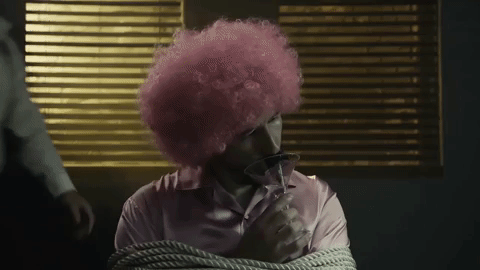
Mostly his horror stuff. Big FNAF security breach fan, as well as of his short films and I still need to watch In Space but recently found out he can sing ???!? Like ???!? Really well??!? Like cast this man in Sweeney Todd kinda well???!!
I also watched about 70-ish percent of Unus Annus before that ended, with the twelve hour finishing stream.
Evan&Katelyn

(gaming + crafting) - married nerds, one being a former wedding planner, which explains their...uh... ~universe~ of lots of different channels. But, so far, they seem really "wholesome" and silly without being stupid. Cool craft videos and their only child is a fluffy black cat. Who they make a lot of stuff for.
Liziqi

oh my GOD the aesthetic... but also with some cool cooking/building/other traditional Chinese skills to follow. She's also VERY vocally for worker's rights in China and the agency that helps run her content is trying to steal her brand and make her just an employee, essentially.
TA Outdoors (gif unrelated I just like it lol)
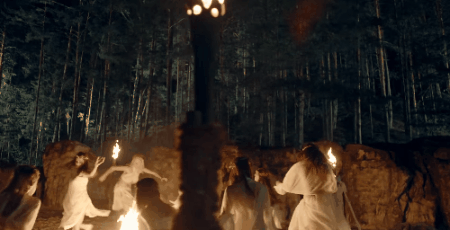
- I'm going to get the details wrong, but it's this guy who purchased a huge chunk of forested land in the UK, for conservation instead of development. He does a lot of cool historical construction and experiments (ROUND HOUSE ROUND HOUSE ROUND HOUSE) and talks about how important it is to understand how things used to be done, and not just bulldoze things all the time.
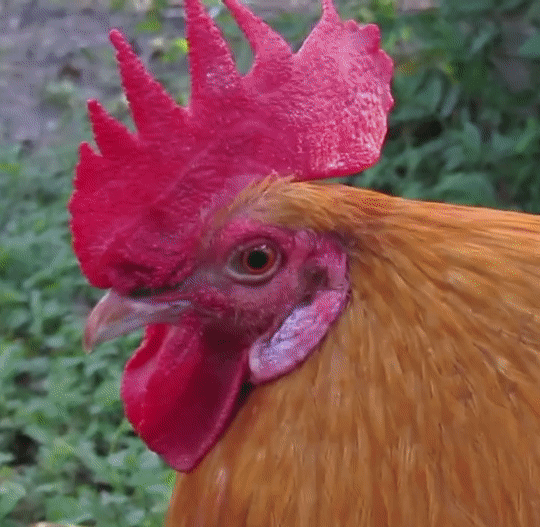
I used to watch Jason Rhodes until they started being more open with their creepy "we're intensely Christian homesteaders who homeschool our 4+ kids on forty acres!"-ness. If anyone following is into the homesteading part, I recommend the super early videos and then tapering off once your hair stands on end. For me it was around the time they started talking about creating their own streaming service but, knowing what I know now it would probably be at least a bit before that.
I also follow "the Welsh Viking," who's this historian doing videos on ACTUAL "viking" history. But because they're so great and thorough I haven't seen many of them because mental energy, but I wanted to put him on this list not only as a self-callout, but recommendation to anyone reading who's into that part of history and can tell Vikings the TV show is fun and all that, but fantasy.
3 notes
·
View notes
Text
The exact make up of the kingdoms of the world is something that is being created as needed because with a project like this that can be part of the fun of world building. I also think drawing an inspiration from history can be a create source of ideas and a way of distinguishing culture. In the particular case of Elbeth this is a world meant to emulate a specific period of history so it's notably important. I have never, however, been a particular fan of just doing fantasy counterparts of real world cultures. I feel that makes the point of a fantasy setting redundant and has some unfortunate implications. For that reason I prefer a bit of a mix and match method.
My normal way of doing it sees a 3-4 mixture. Generally I start by choosing an anchor that serves to the basis for the language and naming schemes of the kingdom. Generally that means a specific land and a specific period (I'll have an example a bit later). Then I attempt to find a totally different place in the world that I feel has developed quite culturally differently but that has underlying similarities to the anchor. With that you have a reference for how things could have developed differently and can begin blending the two to form unique ideas. In addition to this I then try to chose a region fairly close to the anchor to draw additional naming schemes or rules from. Often the historic interaction between two regions leads to show linguistic and cultural synergy that you can use to get an idea of how both's cultural traditions can evolve and change. Finally, I sometimes also try to work in another period of history from the Anchor in order to bring in ideas that are (generally) similar to the anchors but practiced in different ways.
I'm not sure if that explanation was too clear, so here are some examples of some of the places I'm working on here. These are all places that haven't come up yet but are relevant as the homelands of some characters in the works.
Goshima uses Sengoku Japan as its anchor. Samurai have become quite relevant in modern fantasy and the Sengoku as a conflict fits well for the world of conflict and adventure Elbeth is meant to be. For that reason I definitely wanted to fit in. Goshima was chosen as a name primarily because of its historic name of Yashima (eight islands), I was envisioning a place with five large islands and a few smaller ones between them so a name that meant "five islands" seemed quite fitting. I then let that meet with the British primarily Georgian era Britain. Here the primarily similarity I was drawing upon was both being island nations that became naval superpowers. In addition to that I personally see a similarity in Ireland/Wales/Scotland having being united under the rule of England as akin to the many disparate regions of Japan (and later Okinawa/Hokkaido) being united under their emperor and shogun. The reason I favored the Georgian era was primarily my preference for the fashion of that time. As far as somewhere nearby to the anchor goes I'm still searching a bit but I'm presently favoring Indonesia, I'll need to crack open my books though on Indonesian history to determine if there's a specific period I want to use as refrence. Finally for another point in the anchor's history I'm also choosing to draw from the Kofun Period due to me thinking their enormous tombs being really cool to me with a tiny bit of the Jomon period because I really like dogus.
On the other hand Galla uses a mixture of Hundred Year War and the end of the Capetian Era of France as my anchor. Given their influence on romantic/chivalric tales it seems quite relevant to include somewhere highly influenced by France. Galla references its name from the Latin name for the region Gallia but is meant to also invoke Gala a public ball. For its similar but different region I chose Ming Dynasty China. The similarities I was drawing from were that both France & China rank among the most famous of empires and spent significant periods as the main powers of their region. Each saw the construction of many historic landmarks across their various dynasties. Each had the basis for their absolute rule from it being granted by Heaven. I chose the Ming Dynasty primarily because it is contemporary to the Hundred Year War and saw the power of the emperor become more autocratic like the later Age of Absolutism. As for the geographically similar region I chose Medieval Ireland. This overlaps with the next section but the celts had a history within France (and much of western Europe) before winding up primarily in Ireland. I think drawing from that shared history has a lot of potential. Which is why, additionally, as a separate era for my anchor I'm looking towards Celtic France of 300 bc for some additional ideas.
Anyways I heard news about the new 2hu album is out so I'm gonna go look at that now! Goodbye O/
1 note
·
View note
Text
fan language: the victorian imaginary and cnovel fandom
there’s this pinterest image i’ve seen circulating a lot in the past year i’ve been on fandom social media. it’s a drawn infographic of a, i guess, asian-looking woman holding a fan in different places relative to her face to show what the graphic helpfully calls “the language of the fan.”
people like sharing it. they like thinking about what nefarious ancient chinese hanky code shenanigans their favorite fan-toting character might get up to—accidentally or on purpose. and what’s the problem with that?
the problem is that fan language isn’t chinese. it’s victorian. and even then, it’s not really quite victorian at all.
--------------------
fans served a primarily utilitarian purpose throughout chinese history. of course, most of the surviving fans we see—and the types of fans we tend to care about—are closer to art pieces. but realistically speaking, the majority of fans were made of cheaper material for more mundane purposes. in china, just like all around the world, people fanned themselves. it got hot!
so here’s a big tipoff. it would be very difficult to use a fan if you had an elaborate language centered around fanning yourself.
you might argue that fine, everyday working people didn’t have a fan language. but wealthy people might have had one. the problem we encounter here is that fans weren’t really gendered. (caveat here that certain types of fans were more popular with women. however, those tended to be the round silk fans, ones that bear no resemblance to the folding fans in the graphic). no disrespect to the gnc old man fuckers in the crowd, but this language isn’t quite masc enough for a tool that someone’s dad might regularly use.
folding fans, we know, reached europe in the 17th century and gained immense popularity in the 18th. it was there that fans began to take on a gendered quality. ariel beaujot describes in their 2012 victorian fashion accessories how middle class women, in the midst of a top shortage, found themselves clutching fans in hopes of securing a husband.
she quotes an article from the illustrated london news, suggesting “women ‘not only’ used fans to ‘move the air and cool themselves but also to express their sentiments.’” general wisdom was that the movement of the fan was sufficiently expressive that it augmented a woman’s displays of emotion. and of course, the more english audiences became aware that it might do so, the more they might use their fans purposefully in that way.
notice, however, that this is no more codified than body language in general is. it turns out that “the language of the fan” was actually created by fan manufacturers at the turn of the 20th century—hundreds of years after their arrival in europe—to sell more fans. i’m not even kidding right now. the story goes that it was louis duvelleroy of the maison duvelleroy who decided to include pamphlets on the language with each fan sold.
interestingly enough, beaujot suggests that it didn’t really matter what each particular fan sign meant. gentlemen could tell when they were being flirted with. as it happens, meaningful eye contact and a light flutter near the face may be a lingua franca.
so it seems then, the language of the fan is merely part of this victorian imaginary we collectively have today, which in turn itself was itself captivated by china.
--------------------
victorian references come up perhaps unexpectedly often in cnovel fandom, most often with regards to modesty.
it’s a bit of an awkward reference considering that chinese traditional fashion—and the ambiguous time periods in which these novels are set—far predate victorian england. it is even more awkward considering that victoria and her covered ankles did um. imperialize china.
but nonetheless, it is common. and to make a point about how ubiquitous it is, here is a link to the twitter search for “sqq victorian.” sqq is the fandom abbreviation for shen qingqiu, the main character of the scum villain’s self-saving system, by the way.
this is an awful lot of results for a search involving a chinese man who spends the entire novel in either real modern-day china or fantasy ancient china. that’s all i’m going to say on the matter, without referencing any specific tweet.
i think people are aware of the anachronism. and i think they don’t mind. even the most cursory research reveals that fan language is european and a revisionist fantasy. wikipedia can tell us this—i checked!
but it doesn’t matter to me whether people are trying to make an internally consistent canon compliant claim, or whether they’re just free associating between fan facts they know. it is, instead, more interesting to me that people consistently refer to this particular bit of history. and that’s what i want to talk about today—the relationship of fandom today to this two hundred odd year span of time in england (roughly stuart to victorian times) and england in that time period to its contemporaneous china.
things will slip a little here. victorian has expanded in timeframe, if only because random guys posting online do not care overly much for respect for the intricacies of british history. china has expanded in geographic location, if only because the english of the time themselves conflated china with all of asia.
in addition, note that i am critiquing a certain perspective on the topic. this is why i write about fan as white here—not because all fans are white—but because the tendencies i’m examining have a clear historical antecedent in whiteness that shapes how white fans encounter these novels.
i’m sure some fans of color participate in these practices. however i don’t really care about that. they are not its main perpetrators nor its main beneficiaries. so personally i am minding my own business on that front.
it’s instead important to me to illuminate the linkage between white as subject and chinese as object in history and in the present that i do argue that fannish products today are built upon.
--------------------
it’s not radical, or even new at all, for white audiences to consume—or create their own versions of—chinese art en masse. in many ways the white creators who appear to owe their whole style and aesthetic to their asian peers in turn are just the new chinoiserie.
this is not to say that white people can’t create asian-inspired art. but rather, i am asking you to sit with the discomfort that you may not like the artistic company you keep in the broader view of history, and to consider together what is to be done about that.
now, when i say the new chinoiserie, i first want to establish what the original one is. chinoiserie was a european artistic movement that appeared coincident with the rise in popularity of folding fans that i described above. this is not by coincidence; the european demand for asian imports and the eventual production of lookalikes is the movement itself. so: when we talk about fans, when we talk about china (porcelain), when we talk about tea in england—we are talking about the legacy of chinoiserie.
there are a couple things i want to note here. while english people as a whole had a very tenuous knowledge of what china might be, their appetites for chinoiserie were roughly coincident with national relations with china. as the relationship between england and china moved from trade to out-and-out wars, chinoiserie declined in popularity until china had been safely subjugated once more by the end of the 19th century.
the second thing i want to note on the subject that contrary to what one might think at first, the appeal of chinoiserie was not that it was foreign. eugenia zuroski’s 2013 taste for china examines 18th century english literature and its descriptions of the according material culture with the lens that chinese imports might be formative to english identity, rather than antithetical to it.
beyond that bare thesis, i think it’s also worthwhile to extend her insight that material objects become animated by the literary viewpoints on them. this is true, both in a limited general sense as well as in the sense that english thinkers of the time self-consciously articulated this viewpoint. consider the quote from the illustrated london news above—your fan, that object, says something about you. and not only that, but the objects you surround yourself with ought to.
it’s a bit circular, the idea that written material says that you should allow written material to shape your understanding of physical objects. but it’s both 1) what happened, and 2) integral, i think, to integrating a fannish perspective into the topic.
--------------------
japanning is the name for the popular imitative lacquering that english craftspeople developed in domestic response to the demand for lacquerware imports. in the eighteenth century, japanning became an artform especially suited for young women. manuals were published on the subject, urging young women to learn how to paint furniture and other surfaces, encouraging them to rework the designs provided in the text.
it was considered a beneficial activity for them; zuroski describes how it was “associated with commerce and connoisseurship, practical skill and aesthetic judgment.” a skillful japanner, rather than simply obscuring what lay underneath the lacquer, displayed their superior judgment in how they chose to arrange these new canonical figures and effects in a tasteful way to bring out the best qualities of them.
zuroski quotes the first english-language manual on the subject, written in 1688, which explains how japanning allows one to:
alter and correct, take out a piece from one, add a fragment to the next, and make an entire garment compleat in all its parts, though tis wrought out of never so many disagreeing patterns.
this language evokes a very different, very modern practice. it is this english reworking of an asian artform that i think the parallels are most obvious.
white people, through their artistic investment in chinese material objects and aesthetics, integrated them into their own subjectivity. these practices came to say something about the people who participated in them, in a way that had little to do with the country itself. their relationship changed from being a “consumer” of chinese objects to becoming the proprietor of these new aesthetic signifiers.
--------------------
i want to talk about this through a few pairs of tensions on the subject that i think characterize common attitudes then and now.
first, consider the relationship between the self and the other: the chinese object as something that is very familiar to you, speaking to something about your own self vs. the chinese object as something that is fundamentally different from you and unknowable to you.
consider: [insert character name] is just like me. he would no doubt like the same things i like, consume the same cultural products. we are the same in some meaningful way vs. the fast standard fic disclaimer that “i tried my best when writing this fic, but i’m a english-speaking westerner, and i’m just writing this for fun so...... [excuses and alterations the person has chosen to make in this light],” going hand-in-hand with a preoccupation with authenticity or even overreliance on the unpaid labor of chinese friends and acquaintances.
consider: hugh honour when he quotes a man from the 1640s claiming “chinoiserie of this even more hybrid kind had become so far removed from genuine Chinese tradition that it was exported from India to China as a novelty to the Chinese themselves”
these tensions coexist, and look how they have been resolved.
second, consider what we vest in objects themselves: beaujot explains how the fan became a sexualized, coquettish object in the hands of a british woman, but was used to great effect in gilbert and sullivan’s 1885 mikado to demonstrate the docility of asian women.
consider: these characters became expressions of your sexual desires and fetishes, even as their 5’10 actors themselves are emasculated.
what is liberating for one necessitates the subjugation and fetishization of the other.
third, consider reactions to the practice: enjoyment of chinese objects as a sign of your cosmopolitan palate vs “so what’s the hype about those ancient chinese gays” pop culture explainers that addressed the unconvinced mainstream.
consider: zuroski describes how both english consumers purchased china in droves, and contemporary publications reported on them. how:
It was in the pages of these papers that the growing popularity of Chinese things in the early eighteenth century acquired the reputation of a “craze”; they portrayed china fanatics as flawed, fragile, and unreliable characters, and frequently cast chinoiserie itself in the same light.
referenda on fannish behavior serve as referenda on the objects of their devotion, and vice versa. as the difference between identity and fetish collapses, they come to be treated as one and the same by not just participants but their observers.
at what point does mxtx fic cease to be chinese?
--------------------
finally, it seems readily apparent that attitudes towards chinese objects may in fact have something to do with attitudes about china as a country. i do not want to suggest that these literary concerns are primarily motivated and begot by forces entirely divorced from the real mechanics of power.
here, i want to bring in edward said, and his 1993 culture and imperialism. there, he explains how power and legitimacy go hand in hand. one is direct, and one is purely cultural. he originally wrote this in response to the outsize impact that british novelists have had in the maintenance of empire and throughout decolonization. literature, he argues, gives rise to powerful narratives that constrain our ability to think outside of them.
there’s a little bit of an inversion at play here. these are chinese novels, actually. but they’re being transformed by white narratives and artists. and just as i think the form of the novel is important to said’s critique, i think there’s something to be said about the form that fic takes and how it legitimates itself.
bound up in fandom is the idea that you have a right to create and transform as you please. it is a nice idea, but it is one that is directed towards a certain kind of asymmetry. that is, one where the author has all the power. this is the narrative we hear a lot in the history of fandom—litigious authors and plucky fans, fanspaces always under attack from corporate sanitization.
meanwhile, said builds upon raymond schwab’s narrative of cultural exchange between european writers and cultural products outside the imperial core. said explains that fundamental to these two great borrowings (from greek classics and, in the so-called “oriental renaissance” of the late 18th, early 19th centuries from “india, china, japan, persia, and islam”) is asymmetry.
he had argued prior, in orientalism, that any “cultural exchange” between “partners conscious of inequality” always results in the suffering of the people. and here, he describes how “texts by dead people were read, appreciated, and appropriated” without the presence of any actual living people in that tradition.
i will not understate that there is a certain economic dynamic complicating this particular fannish asymmetry. mxtx has profited materially from the success of her works, most fans will not. also secondly, mxtx is um. not dead. LMAO.
but first, the international dynamic of extraction that said described is still present. i do not want to get overly into white attitudes towards china in this post, because i am already thoroughly derailed, but i do believe that they structure how white cnovel fandom encounters this texts.
at any rate, any profit she receives is overwhelmingly due to her domestic popularity, not her international popularity. (i say this because many of her international fans have never given her a cent. in fact, most of them have no real way to.) and moreover, as we talk about the structure of english-language fandom, what does it mean to create chinese cultural products without chinese people?
as white people take ownership over their versions of stories, do we lose something? what narratives about engagement with cnovels might exist outside of the form of classic fandom?
i think a lot of people get the relationship between ideas (the superstructure) and production (the base) confused. oftentimes they will lob in response to criticism, that look! this fic, this fandom, these people are so niche, and so underrepresented in mainstream culture, that their effects are marginal. i am not arguing that anyone’s cql fic causes imperialism. (unless you’re really annoying. then it’s anyone’s game)
i’m instead arguing something a little bit different. i think, given similar inputs, you tend to get similar outputs. i think we live in the world that imperialism built, and we have clear historical predecessors in terms of white appetites for creating, consuming, and transforming chinese objects.
we have already seen, in the case of the fan language meme that began this post, that sometimes we even prefer this white chinoiserie. after all, isn’t it beautiful, too?
i want to bring discomfort to this topic. i want to reject the paradigm of white subject and chinese object; in fact, here in this essay, i have tried to reverse it.
if you are taken aback by the comparisons i make here, how can you make meaningful changes to your fannish practice to address it?
--------------------
some concluding thoughts on the matter, because i don’t like being misunderstood!
i am not claiming white fans cannot create fanworks of cnovels or be inspired by asian art or artists. this essay is meant to elaborate on the historical connection between victorian england and cnovel characters and fandom that others have already popularized.
i don’t think people who make victorian jokes are inherently bad or racist. i am encouraging people to think about why we might make them and/or share them
the connections here are meant to be more provocative than strictly literal. (e.g. i don’t literally think writing fanfic is a 1-1 descendant of japanning). these connections are instead meant to 1) make visible the baggage that fans of color often approach fandom with and 2) recontextualize and defamiliarize fannish practice for the purposes of honest critique
please don’t turn this post into being about other different kinds of discourse, or into something that only one “kind” of fan does. please take my words at face value and consider them in good faith. i would really appreciate that.
please feel free to ask me to clarify any statements or supply more in-depth sources :)
1K notes
·
View notes
Text
Blending Mythos Respectfully
@sapphicq submitted:
Hi all! I’m trying to write an urban fantasy that explores oppression in a world that is basically the same as ours, except with magic, while incorporating magical systems and mythologies of multiple cultures. I’ve done an okay amount of research on each one that I’d like to include (still need to do more for sure, especially considering how colonization has effected mythologies). However, I’m struggling a bit on how they should coexist, since in the world I’m writing about they’re present and tangible. One example of this is fox spirits in East Asian mythology. Japanese, Korean, Vietnamese, and Chinese mythologies each have a nine-tailed fox, and though my research says that the myth originates from Chinese mythology, it also says that each of the fox spirits carry different connotations of malevolence, benevolence, and how widespread they are, depending on which culture’s mythology is being referred to.
The same sort of thing has been popping up quite a lot in a lot of my research. I started to wonder if I could explain these similarities within world as “different cultures have come up with different names and customs surrounding the ‘same’ thing,” considering mythology in the real world from an anthropological perspective. However I don’t want to overgeneralize, especially considering that these different mythological figures are meant to be present and tangible. If I went that route, I wouldn’t want to say something like ‘actually, benevolent fox spirits do exist, and Korean mythology about fox spirits is wrong since Kumiho are pretty strictly malevolent,’ which would obviously be an implication. All this to say: do you have any tips for multiple mythos coexisting in a way that respects the various cultures they come from?
Avoid Round Pegs in Square Holes
A mistake you sometimes see Western authors make when dealing with mythology in urban fantasy settings is to confine the universe’s worldbuilding to a particular mythology or force the rules of a single culture’s folklore onto other cultures. For instance, here at WWC, we get a lot of questions asking how to represent supernatural creatures from multiple cultures respectfully alongside fae from Western Europe, and it's fairly obvious that the author plans to treat all supernatural creatures as fae. Urban fantasy based on Greek mythology or Christian mythology often falls into the same trap.
I think a writer can demonstrate greater creativity by embracing these differences. I think a potential way to deal with contradicting mythos between cultures is to come up with compelling reasons why differences exist. What world-building systems, philosophies and real-life phenomena allow for a framework that explains the simultaneous existence of commonalities and differences? As you know, in anthropology, there are theories that emphasize cultural diffusion as a way to explain similar customs within the same region, but there are also theories that hold that multiple cultures can develop the same traditions and principles independent of each other (See: existence of 0, lost-wax bronze casting, astronomical calendars and the use of wheels). The answers I’ve given are mostly technological. However myths and belief systems serve very real social functions as ways to keep people together and cultivate norms and mores. Lesya expands on the utility of intentional cultural diffusion below.
Similarly, within evolution, there are instances of species having common features because of a shared ancestor, but also instances where species without shared ancestors evolve to have similar features because they exist in the same environment. I believe flippers are examples of both types of evolution in marine animals. Thus, I think you need to question your assumption that “different cultures have come up with different names and customs surrounding the ‘same’ thing.” As the world is daily proof, they sometimes do, but they also sometimes don’t.
-Marika
First, props to you for sending us this ask. You have been thinking about this a lot and have done research into building an urban fantasy that doesn’t do the thing of putting all Asians under one umbrella.
Second, I’m going to agree with Marika here. Rather than go for the generalization route, revel in everyone's differences. It's a way for you to acknowledge the variations in the mythology, that not all have the same origins though there may be some similarities. Instead, they may have reached the same conclusions. My advice for blending mythologies is to lean into it, and not create a homogeneous umbrella. You can make something amazing with that.
-Jaya
Hybridity Through Diffusion
So a myth originated in China. This does not mean Chinese tellings have the monopoly on what a telling is. Marika and Jaya have gone into a possible solution, here, but what I’m going to examine here is a mental framework that a lot of people get stuck in that is actually ahistorical.
Cultural appropriation as we know it is shockingly recent when it comes to history. In the modern day, ownership boundaries of myths have become very strict because of primarily European colonialism picking and choosing everything it likes about a mythos, and, this is important: not letting up on the oppression of those peoples. There’s also a strong preference to kill those colonialism deems “wrong”, instead of creating a hybrid culture.
Historically, this got a lot more fluid.
What happened historically was primarily cultural diffusion, wherein open trade, intermarriage, and shared borders made it that myths, customs, and cultural practices were (mostly) freely exchanged without massive power imbalances happening, and then modified to fit local beliefs.
Key word: mostly. Because yes sometimes it happened that one place took over another place and imported all of its customs (see: China, Rome, the Mughals), but… often* the ruling power either backed off, was fought of, or otherwise left the region, leaving the common people to do whatever they wanted with the carcass of what had been imposed on them. Or sometimes, even, the imperial forces would actively create a hybridized culture in order to better rule others.
* in places where the ruling power has NOT backed off on oppression and assimilation, even if the colonialism is very old, then this is invalid and the power dynamics of appropriation are still at play.
Because, historically, there was a lot less incentive to simply genocide the peoples you took over (which is what made armies that did destroy all they took over so noteworthy). People were needed to keep providing food and materials, even if the new person got the resulting taxes.
This meant there were a lot more common people to play with the stuff imported by the imperial culture. And there was a lot more incentive to hybridize your customs to the common people’s customs, leading to the sometimes-hilarious situations like “Rome assigns an equivalence in their pantheon for literally every mythology they encountered, which was a lot.”
This also explains early Christianization, because it was a lot safer to simply adapt what you already had to make it better for your own ends than curbstomp everything that was “wrong” to your worldview. Ireland’s mythology survives in huge swaths, because it was either Christianized wholesale, or it was about “historical humans” and not fae. Norse mythology was similarly adapted for Christian worldviews, which means we unfortunately have no idea what the pre-Christian myths were.
So instead of thinking in terms of ownership, think instead in terms of diffusion.
Myths get imported along with food, cloth, or anything else necessary for life. Myths were, historically, a way for people to explain the world around them, both in place of and alongside science. “Ghost marches” are really common, globally, because if you have wind howling in the forest, it’s going to sound like predators, and predators mean go inside and lock the door. Weaving goddesses are also common, because weaving was so necessary to survive the elements.
Sometimes trade relationships soured, and you get bad associations with the imported stuff. Sometimes the relationship stayed great for long enough it got completely adapted. This doesn’t mean any one myth is “right”, nor does it mean you have to erase historical trade links. It just means you look at the historical context, understand that cultural exchange often used to be a lot more two-way than it is in modern appropriation times, and figure out what that means for your worldbuilding.
~ Mod Lesya
#worldbuilding#mythology#fantasy#Intercultural#cultural exchange#cultural diffusion#anthropology#history#folklore#asks
868 notes
·
View notes
Text
Southeast Asian Fantasy, Scott Watanabe's Raya, and Gubat Banwa 5
Part 1, Part 2, Part 3, Part 4
Gonna skip forward a bit to the other cool parts.
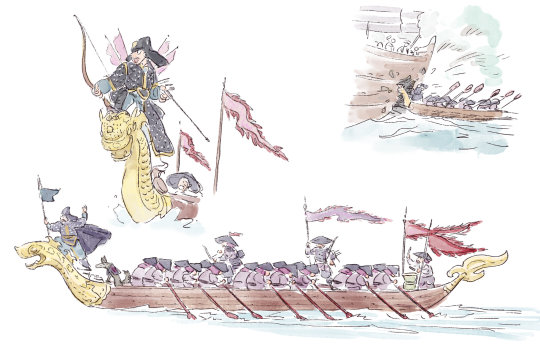
The dragon boat rowing stuff is arguably Southeast Asian, but it's still a traditional Chinese thing. And of course the armors and all are very East Asian, though from what I know the Dai Viet had very similar armors. Now I'm left to wondering if they could do a "Southeast Asian setting with Fantasy!China as a major player" as China was historically, during the height of the Maritime Nusantara Trading Network.

Here Scott starts enumerating each of the Five Cultures of Makara. Aside from the stellar art of course, Heart's clothing resembles Javanese or Thai or Cambodian even Balinese clothing! With that sarong like thing closed in by a belt. That's really cool. And with the hair style too, being that chignon style, is afaik also something seen even in Precolonial Philippines (which wasn't as Indianized as their western brethren, though they probably also had the sarong + belt combo). Fang can maybe pass of for Dai Viet, but Spine is not something I could confidently say passes for Southeast Asian. Maybe Mongolian? Tail could somewhat pass for Indonesian as well, although it's a bit non-traditional, with the belt and all, but the textiles and knots can work. Claw is reminiscent of the clothing of various Lumad (indigenous people) folk here in the Philippines, such as the Bagobo's and the Yakan, so that's another mark in their favor.
I think Raya's setting could've benefitted from it being a lot more huge than just Southeast Asian. It covers most of the Southeast and East Asian world, from the Steppes to the Seas. That would've been cool.
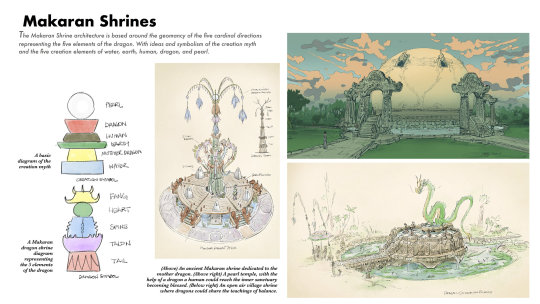
Here's the cool shit. Most of the lore isn't inherently tied down to any particular Southeast Asian folklore as far as I know, but its aesthetics are very Southeast Asian. Particularly the Hindu-Buddhist trappings of the Indianized states, like Angkor Wat and Majapahit.
It's cool af worldbuilding though.
This one in particular, the Mother Dragon Temple:
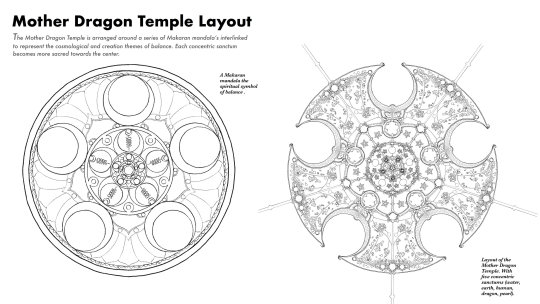
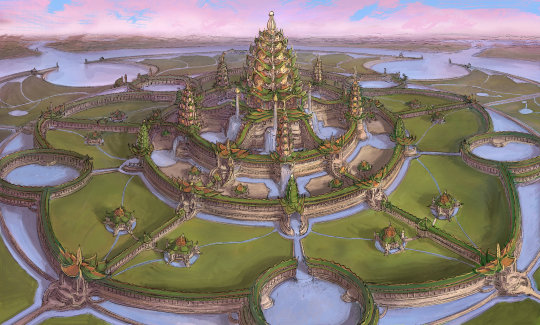
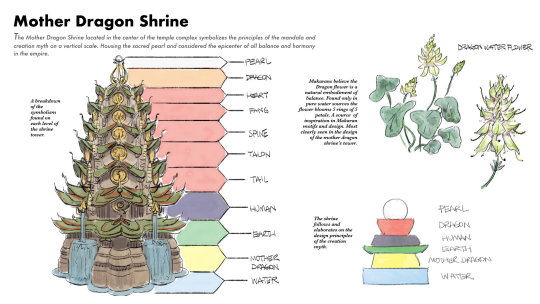
Now that looks like Angkor Wat. A huge temple complex. This shit rocks. Temples like this in Gubat Banwa wouldn't be found in the Sword Isles, but rather, in the places with larger landmasses, such as Madaki and Malirawat.
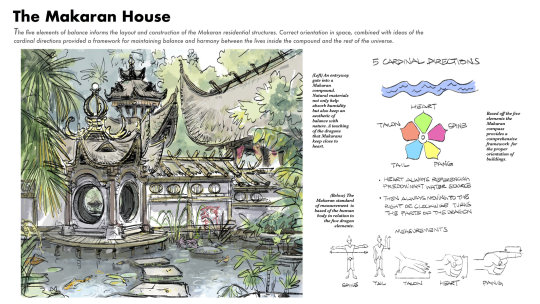
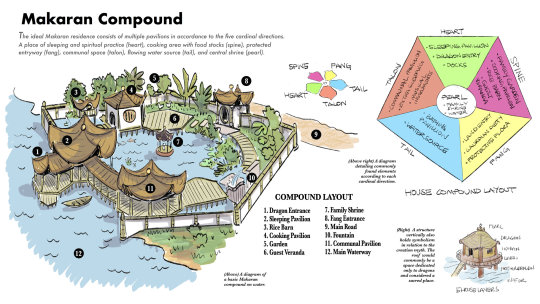
I also love this one. Some fucking good as fuck worldbuilding and some very Southeast Asian aesthetics. The compound reflects the compound of richer folk in kampung in the Malay and Indonesian area, and the roofs and walls feel very Southeast Asian. Like wow, especially with the pentagonal lore (irl SEA houses were decidedly square and being square had geomantic reasonings across many of the cultures (each side of the house must face a particular side etc. for good health etc., and among the Tausugs one would build a house facing a certain direction depending on the month, so that it faces the Naga as it circles the universe).

I absolutely love this piece of lore. On or beside a water source is one of the most obvious and common places for SEA settlements to be built on. Love this shit. Stuff like this makes me wish that Raya was a TV Series Epic instead sometimes.
Watanabe then goes on to detail various cultural details, like Pearl's greeting gestures (which are cool), and Talon here, which is a nomadic culture and are very much inspired by the Steppe nomads of northern Asia than any Southeast Asian setting.

Anyway, that's most of Scott's art. I skimmed over others (like the aforementioned hand gestures) so if you want to see those, head over to his site! https://www.scottwatanabeart.com/raya-and-the-last-dragon
Now I'll go on to talk a bit about anachronisms, idealisms, and consumerisms as I mentioned in the first post.
Anachronisms deals in the fact that so much of our culture is spread across large swathes of time, and this will inevitably lead to some anachronisms. A Precolonial Philippine setting with pancit canton or lumpia, for example, is anachronistic, since those two iconic dishes came in only during the Spanish Era, when trade with China boomed. I personally kind of love anachronisms, but only if they're there to heighten both the aesthetic and cultural experience of a setting. So for Gubat Banwa, I'm good with making it so that there are places that sell pancit canton like ramen shops, even though that's way out of the inspiration's timeline, because one: it looks cool and I love pancit, and two: it heightens the cultural experience. Pancit canton and lumpia are Filipino food staples, so I want to put them in for a hyper fantasy Philippine setting. This goes the same for other Southeast Asian settings: if you do Ancient Vietnam, will Champa be part of it? Because Champa was a huge part of Classical Southeast Asia. Much of Indonesian and Malay culture have been influenced by Islam, but their largest empires: Srivijaya and Majapahit, are both decidedly Hindu-Buddhist states, so there will be a dissonance of values and cultures if not taken into account.
Idealisms deal in "how we want to see ourselves". If I wrote an accurate Precolonial Fantasy setting, there would be a lot of things gone. The notion of huge cities fortified with walls would be scaled down considerably. The notion of giant towers and pagodas and statues would be gone. However, this is Fantasy. When going about writing for Gubat Banwa, I didn't particularly want to write something accurate. Rather, I wanted to write something idealistic. Fantastic. A fantasy setting that's inspired deeply and is founded upon our own ancestries and stories. I looked to the epics and found tales of the Seven-Roofed house from the Hinilawod, and tales of the great city of Mantapoli that grew so large that the angel Gabriel had to ask permission from God to teleport it to the center of the earth, and stories of the City that was brought to heaven. Idealisms in Gubat Banwa was about making a fantasy setting that could tell stories that were centered on us, and the unique stories that could rise from that. Southeast Asian fantasy settings would be more enriched if they do the same, because Southeast Asia is a land of stories, because of the vast amounts of ethnogroups, there are so many stories waiting to be told. Philippines in particular has had so many stories during or after the Spanish era, and while Colonialism is a valid part of our national consciousness, there is of course still room for stories that aren't built upon the backdrop of Colonial Oppression and invasive cultures. Stories about our people that willingly took beliefs and religions from other places, and indigenized them. And weren't taken advantage of of course.
Consumerisms tackle the hardest part of Gubat Banwa. With such a focused and specific setting, how can one sell it? How can you ask people to partake in it, something with such little representation that people still get it wrong? At this point, all I can do is two things: try to make things a bit easier for people's palate, especially the West (I've done this in Gubat Banwa, turning some terms straight up into English, and putting resources and comparisons to similar Western concepts). The other thing is ask. Ask others to trust us and our stories, and ask them to not be afraid to fuck up a bit, just revel in our vibes, in our stories. How else will our stories be heard? It's either that or we will languish in obscurity, until the inevitable wave of neocolonialism, imperialism, and capitalism erases our stories for good.
Thanks for reading all of that. I hope you enjoyed this series of posts! Check out Gubat Banwa if you have the time, that shit as painful as it is cathartic to write. Thanks again.
#fantasy#raya and the last dragon#philippines#filipino#rpg#ttrpg#writing#folklore#gubat banwa#dnd#d&d
74 notes
·
View notes
Text
@lansplaining encouraged me to finish this random meta nobody asked for, so let's talk about Meng Yao, Meng Shi, and 孟母三遷 (mèng mǔ sān qiān), a proverb about good parenting.
A warning: this is super long (even for me!) and is less quality meta and more my ADHD brain jumping around a maze of loosely related ideas. Proceed with caution!
Let me start by briefly going through why I decided to write this, because it’s important. In haunting Meng Shi’s tag in my starvation for Meng Shi content, I’ve multiple times come across the idea that Meng Shi pushed Meng Yao too hard, that she should’ve been more careful with teaching him to seek his father’s approval at any cost, and that she was too naïve. I’ve never reblogged this kind of post because 1) I personally think it’s rude to go out of your way to ramble about how much you disagree with someone on their own post and 2) if this was an isolated incident I wouldn't care either way, so I didn’t want to direct this rant at anyone in particular. It’s more to do with a tendency, primarily (as far as I can tell) from fans who haven’t had much contact with Chinese culture, to oversimplify Meng Shi and make her relationship with Meng Yao slightly disturbing, and I think part of it is due to CQL basically cutting out her entire storyline (so fans simply don’t have info about her to assess her fairly) and part is due to misunderstanding what a good parent is supposed to act like in the context of Ancient China.
[Of course, Ancient China is not a very useful historical concept, not any more than “ye olde Europe” - things change a lot based on time and place - but you know. It’s fantasy. Extremely broad trends are okay in this case.]
Anyway, the idea behind the posts I mentioned is, basically, that Meng Shi (usually through no fault of her own) is to blame for Meng Yao’s obsession with power, since his desire for approval was inherited from lessons she taught him. Just to start with, I’d argue that Meng Yao isn’t power-hungry as much as he craves security and respect, but that’s a different meta. Let’s assume that she really did teach him to be Like That. Was she wrong to do so? I’m not looking for “does that make for a happy, well-adjusted childhood?” or “would you raise your own son as Meng Shi did?” - I’m trying to figure out, would she have been considered a bad mother in the context of the society she lived in? I don’t think she would’ve.
It is surprisingly hard to find texts about the obligations of parents in Ancient China. Their main obligation is to raise filial children, but I feel like that’s not very useful: whether or not parents are good parents, children are expected to be filial, so a child being filial really says more about the child than about the parent. Maybe the parent completely missed the mark and society at large was what taught the child to be filial!
We can assume, of course, that parents were to raise good people, and that by learning what a good person looked like, we could figure out whether the parent was successful, but once again, I feel like that’s pinning things on the outcome, not on the process - the best of parents can end up with an awful kid and vice versa.
While thinking about all this, it took me a frankly embarrassing amount of time to remember the story of Mother Meng and Meng Zi, but once I did, it wouldn’t leave my mind - in part because the Meng here is the exact same Meng of Meng Shi and Meng Yao (yay! fun if useless parallel!), and in part because this is a story about how a woman can successfully raise a son by herself.
Okay, so important note: one of the most influential ancient Chinese thinkers is Meng Zi (孟子 Mèng Zǐ), who is known in the West as Mencius. If you've never heard of him - he's perhaps second in importance only to Confucius. When Mencius was still a young child, his father died, so he was raised by his mother, who is usually known only as Mother Meng (in Chinese, 孟母 Mèng Mǔ.)
Mother Meng's story is told in Biographies of Exemplary Women (列女傳 Liènǚ Zhuàn), which for around 2000 years beginning around the 18th century BCE, was the most commonly used book used to educate women. The book is divided into sections, each one showing a different way women could be honorable and good. Mother Meng's story is told in the Maternal Models section (母儀傳 Mǔ Yí Zhuàn.) The story has a few parts, some of which I'll quote, always from Kinney's 2014 translation.
Before I go on to quote it, though, I'd like to establish that Mother Meng's story is so, so famous that even if Meng Shi had never read this particular book, I'm almost certain she would've been familiar with at least the outlines of Mother Meng's story. I'm not cherry picking a suitable chapter from the book, I'm literally going with the most famous story in it because Meng Shi would be most likely to know this one if she knew no other story.
Okay, the first part of the tale takes place when Mencius is a young boy and Mother Meng is a widow raising him.
The mother of Meng Ke of Zou [a different name for Mencius] was called Mother Meng. She lived near a graveyard. During Mencius’ youth, he enjoyed playing among the tombs, romping about pretending to prepare the ground for burials. Mother Meng said, “This is not the place to raise my son.” She therefore moved away and settled beside the marketplace. But there he liked to play at displaying and selling wares like a merchant. Again Mother Meng said, “This is not the place to raise my son,” and once more left and settled beside a school. There, however, he played at setting out sacrificial vessels, bowing, yielding, entering, and withdrawing. His mother said, “This, indeed, is where I can raise my son!” and settled there. When Mencius grew up, he studied the Six Arts, and finally became known as a great classicist. A man of discernment would say, “Mother Meng was good at gradual transformation.”
According to the translator's footnote, "gradual transformation" is "a childrearing technique, whereby a child is morally formed through daily exposure to correct models of behavior."
From this story comes the proverb 孟母三遷 (Mèng Mǔ sān qiān) - "Mother Meng moved three times." It's come to mean that a parent - especially the mother of a male child - should spare no efforts to provide an environment that will give their child a good education, paying particular attention to what models are surrounding them.
I'm sure I don't need to say if Meng Shi was at all familiar with this proverb (and she would probably be), she must have been very stressed out over literally raising her son in a brothel. (Here I must mention sex workers in ancient China were often essentially owned by the brothels, so literally "moving three times" wasn't really an option for Meng Shi even if she could miraculously pick up another trade.) Meng Shi did however at least try to surround Meng Yao with the accomplishments appropriate for the son of a cultivator:
Xiao-Meng, are you still learning those things lately? [...] The things your mom wants you to learn, things like calligraphy, etiquette, swordsmanship, meditation… How are those things going? [...] His mom’s raising him as a young master of a wealthy family. She taught him how to read and write, bought him all those swordsmanship pamphlets, and even wants to send him to school.
Meng Yao actually talks a little bit about “those swordsmanship pamphlets” in the only time in canon he directly shares memories about this mother:
Lan XiChen, “Your [guqin] skills are also considered quite fine outside of Gusu. Were they taught by your mother?”
Jin GuangYao, “No. I taught myself by watching others. She never taught me such things. She only taught me reading and writing, and bought a handful of expensive sword and cultivation guides for me to practice.”
Lan XiChen seemed surprised, “Sword and cultivation guides?”
Jin GuangYao, “Brother, you haven’t seen them before, have you? Those small booklets sold by the common folk. First jumbled sketches of human figures, then deliberately mystified captions.”
Lan XiChen shook his head, smiling. Jin GuangYao shook his head as well, “All of them are scams, especially to fool women like my mother and ignorant children. You won’t lose anything by practicing them, but you definitely won’t gain anything either.”
He sighed in a rueful way, “But how could my mother have known this? She bought them no matter how expensive they were, saying that if I returned to see my father in the future, I had to see him with as much competence as possible so that I don’t fall behind. All of the money was spent on this.”
See what’s happening? Meng Shi cannot physically take Meng Yao to cultivators, but she spares no efforts in giving him the closest thing she possibly can -- figuratively, we might say she moved three times.
Of course, these booklets don’t work, but as Meng Yao says, how could she have known this? The cultivation world is very closed off - think of how the entire Mo household gathers to see Lan juniors, and how Wei Wuxian mentions once that “Cultivation families, in the eyes of common folk, are like people favored by God, mysterious yet noble.” Not just noble, but mysterious. That tracks, too - I mean, they live in inaccessible households and mostly leave to night hunt or visit each other, neither of which is an activity that would allow commoners to get much more than an occasional glimpse of them.
Now, if Meng Shi doesn’t even know that a pearl for Jin Guangshan was just a trinket, if she doesn’t know even the wealth of a major sect, how can she read booklets and decide whether that’s genuine cultivation or not? All that she sees is a chance for Meng Yao to be surrounded by the ideas and skills of the people she wants him to emulate - cultivators - and therefore she does everything she can to get him that chance. Mother Meng moved three times.
Okay, but maybe the argument is not “Meng Shi shouldn’t have pushed Meng Yao to cultivation” but rather “she should’ve pushed him, just not too hard." To that, I present another tale from Mencius' childhood:
Once, when Mencius was young, he returned home after finishing his lessons and found his mother spinning. She asked him, “How far did you get in your studies today?” Mencius replied, “I’m in about the same place as I was before.” Mother Meng thereupon took up a knife and cut her weaving. Mencius was alarmed and asked her to explain. Mother Meng said, “Your abandoning your study is like my cutting this weaving. A man of discernment studies in order to establish a name and inquires to become broadly knowledgeable. By this means, when he is at rest, he can maintain tranquility and when he is active, he can keep trouble at a distance. If now you abandon your studies, you will not escape a life of menial servitude and will lack the means to keep yourself from misfortune. How is this different from weaving and spinning to eat? If one abandons these tasks midway, how can one clothe one’s husband and child and avoid being perpetually short of food? If a woman abandons that with which she nourishes others and a man is careless about cultivating his virtue, if they don’t become brigands or thieves, then they will end up as slaves or servants.” Mencius was afraid. Morning and evening he studied hard without ceasing. He served Zisi [a great scholar whose grandfather was Confucius] as his teacher and then became one of the most renowned classicists in the world.
Notice that Mother Meng moved three times to ensure Mencius would have the highest of aspirations - to become a scholar. But just aspiration isn’t enough. Not by any means. Now that Mencius is actually studying, Mother Meng is willing to take an extreme action to ensure he's taking it seriously. Mencius doesn't have a father to smooth his path to success. He has to learn that aspiring to greatness isn't enough. He'll have to put in the effort as if his life depended on it. And if he doesn't persist in his hard work, everything he's done thus far will be useless. Sounds like a lesson imparted on young Meng Yao, doesn’t it?
A lot of fandom rage towards Meng Shi would apply to China's Best Mom Contender, Mother Meng. She gives her son big dreams, and teaches him how to go about achieving them in a society where failing is easier than succeeding. Yes, it's fair to say that Meng Shi taught Meng Yao to refuse to settle for anything less than being “Jin Guangshan's son, a respected cultivator.” Yes, it's also fair to say that she probably didn't allow him much time to play like children his age did. But unfortunately, in the world of MDZS, poor children probably wouldn't get to play anyhow, the difference is that they'd usually be working, not studying. Studying is a privilege! It’s a privilege Meng Yao could not afford but was given to him anyway, through his mother’s many sacrifices. We can even say that while she was alive, Meng Shi was trying to ensure Meng Yao would one day have a better life, at the expense of a fun childhood - and that's very Mother Meng of her, whatever our modern Western sensibilities might have to say about that.
Finally, I’d skip other tales (which show Mother Meng and an adult Mencius) and go straight to the poem that ends the Mother Meng section:
The mother of Mencius
Was able to teach, transform, judge, and discriminate.
With skill she selected a place to raise her son,
Prompting him to accord with the great principles.
When her son’s studies did not advance,
She cut her weaving to illustrate her point.
Her son then perfected his virtue;
His achievements rank as the crowning glory of his generation.
I’d like to focus on the last verse - “His achievements rank as the crowning glory of his generation.” All that Mother Meng wanted was for Mencius to not completely ruin his life, but he became great. You can so very easily see a parallel with how Meng Shi hoped Meng Yao would be a cultivator but he became Jin Guangyao, Chief Cultivator, styled Lianfang-zun, one of the Three Venerable, hero of the Sunshot Campaign.
Of course you can say “Jin Guangyao did many Very Wrong Things to get there, though!” Which, sure, okay, fair point. How many and how wrong depends on which canon we're discussing, and your own interpretation, but there’s no version of the story in which Jin Guangyao is 100% an innocent child uwu. But blaming that on Meng Shi is just... straight up weird? I don’t see anyone going “If Jiang Fengmian hadn’t adopted Wei Wuxian, he’d never have dared become Yiling Laozu!” and that’s pretty much the same logic. Would street kid Wei Wuxian have invented a new type of cultivation if he had never been taken in by the Jiang? Probably not, but raising undead armies is very much not something Jiang Fengmian could’ve predicted. In the same way, how could Meng Shi have predicted that teaching her pre-adolescent son “You are the son of a cultivator, act like one and earn your place in society” would’ve ultimately resulted in innocent deaths? How could she predict “You’re not destined to having the same horrible life I did, you can get something better than this” was a bad thing to teach? I quite honestly don’t know.
Finally, I'd like to point towards a much flimsier evidence that Meng Shi did great as a parent. And that is Meng Yao’s love. Nie Huaisang at some point comments Meng Shi is someone who Meng Yao "cherishes more than his life," and I think his assessment is correct.
Even putting aside the fact he built a whole temple to get his mother to reincarnate into a better life, and even putting aside how he refuses to flee the country without her remains, there's still crystal clear evidence that Meng Shi must've done something right. Because a lifetime of people using his mother to bully him doesn't seem to have made Meng Yao resent her. Had their relationship not have been very strong, odds are he'd feel bitter and/or ashamed of her. That doesn't seem to be the case. He's attached to her even decades after her death.
I want to be very careful with equating mutual affection with good parenting, though. When I was a rather rebellious teenager, my mother (in typical Chinese fashion) used to say that parents and children don't have to love each other as long as they're dutiful to each other, by which she meant that a parent-child relationship isn't informed by warm and fuzzy feelings, but by whether you'd be willing to do anything for each other. Specific to my case, she meant "I don't care if it makes you hate me, you will do as you're told because that's what's best for you." (That may also be the reason why people more familiar with Chinese culture see the Jiang family less as outright abusive and more as #complicated, but that's another meta.)
Whether your kid wants to hug you every time they see you is of no consequence to traditional Chinese thought - raising them to be the best they can is all that matters, because at the end of the day, you won't be around forever, but you can definitely set up your kid's life so that it goes smoothly and virtuously. How that's accomplished varies depending on many factors, but to have the goal be "I want my child to love me" rather than "I want to raise my child right" would've been considered selfish as hell.
So even if all that Meng Shi had given Meng Yao had been stern lessons about the need to go get his birthright, she would've still have been considered a good mother!! In fact, she would've been doing everything she was supposed to do, under extremely difficult conditions! (Remember the importance of environment? That Meng Yao grew up to want to be a cultivator despite having probably never even met one speaks wonders about Meng Shi's childrearing powers!!)
But just based off how over the top Meng Yao's filal dutifulness is, I'd go a step further and say that even as she did the impossible, she was also loving enough to inspire genuine affection. This is complicated because children who have present fathers could expect their mothers to be tender with them. The first century BCE text 禮記 Lǐ Jì or The Classic of Rites says that:
Here now is the affection of a father for his sons - he loves the worthy among them, and places on a lower level those who do not show ability; but that of a mother for them is such, that while she loves the worthy, she pities those who do not show ability - the mother deals with them on the ground of affection and not of showing them honour; the father, on the ground of showing them honour and not of affection.
But when the father figure is lacking for any reason, the mother must abandon her tenderness because someone must guide the child, and without a father, the role falls to the mother. A single or widowed mother had to be very careful to not smother their children with affection and raise useless, spoiled kids, or so it was thought. (The presence of Qingheng-jun and Lan Qiren is why Madame Lan can be so affectionate with the Lan boys, by the way - if she was raising them by herself she would've been expected to be much more practical. AUs where she just gets her kids and runs away could do very cool things with this idea. But I digress!)
Where was I? Oh, okay. Because Meng Yao seems to not just respect, but actively miss her, it seems that Meng Shi somehow managed to deal with her son on the ground of both honor and affection, to paraphrase.
So basically, all things considered, it seems not only would Meng Shi have been considered a great mom (if people could look past her being a prostitute, anyway) but she also went above and beyond the bare minimum. She truly spared no efforts on any front to make sure her son had everything your average gongzi would have - someone to teach him and someone to love him, access to education and confidence in his birthright. That she couldn't actually make him a cultivator, that she couldn't actually raise him in a proper home with no one being cruel to herself or him - that's immaterial. Even Mother Meng couldn't control what her neighbors did, only what she taught her son! The key point is Meng Shi tried. She did everything she could to educate her son right. You couldn't ask more of her, and quite honestly, you should probably be asking less.
Of course we can't err on the other extreme and say she was Perfect. Given MXTX only ever writes flawed characters, we can safely assume that if we'd known more about Meng Shi, we would've seen many flaws. Indeed, just the fact she didn't teach Meng Yao the guqin when he apparently wanted to learn it might point to some conflict we don't know enough to speculate about (maybe she focused too much on cultivation when Meng Yao's interests lay elsewhere? Maybe she wasn't able to sufficiently shelter him and he felt it'd be a burden to ask her to teach him anything? Maybe maybe maybe, go wild with your fics.) Nevertheless, I would never hold a female character to a higher ideal than a male character - if the male cast of MDZS can be a hot mess and still be admirable for what they're trying to do, then so can Meng Shi.
At the end of the day, when I look at Meng Shi - and I've made myself a document with all the references to her in the novel canon so I could easily contemplate her life and character - all I see is a woman every bit as determined and resourceful as her son, willing to do everything it took to raise her little boy into the sophisticated and ambitious man he became.
Finally, here's a fun little parallel that I'm 100% sure was unintentional but I still love. I said Meng Shi couldn't have moved three times. She couldn't, but I think maybe she taught her son he was worth moving three times for. Qinghe Nie. Qishan Wen. Lanling Jin. Isn't that super fun to think about?
Alternatively, tl;dr: Oh My God I Can't Believe We're Blaming Women For The Actions Of Their Adult Children In The Year Of Our Lord 2k21, Meng Shi Was Doing Her Best, Chill!
#drinking game#take a shot every time i say 'finally'#this post refused to let me get to the end of it lol#i think because i'm extremely salty about fanon stage mom meng shi#(to not say tiger mom meng shi which crosses into outright racism. but i'm giving people the benefit of the doubt)
157 notes
·
View notes
Note
I'm a Chinese, nationally and racially. Racial projection seems to be a common practice in western fandom, doesn't it? I find it a bit... weird to witness the drama ignited upon shipping individuals with different races, or the tendency to separate characters into different "colors" even though the world setting doesn't divide races like that. Such practice isn't a thing here. Mind explaining a bit on this phenomenon?
--
Sure, I can try. But of course, fish aren’t very good at explaining the water they swim in.
Americans aren’t good at detecting our own Americanness, and a lot of what you’re seeing is very much culturally American rather than Western in general. (In much of Europe, “race” is a concept used by racists, or so I’m told, unlike in the US where it’s seen more neutrally.) Majority group members (i.e. me, a white girl) aren’t usually the savviest about minority issues, but I’ll give it a shot.
The big picture is that most US race stuff boils down to our attempts to justify and maintain slavery and that dynamic being applied, awkwardly, to everyone else too, even years after we abolished slavery.
There’s a concept called the “one drop rule” where a person is “black” if they have even one drop of black blood.
We used to outlaw “interracial” marriage until quite recently. (That meant marriage between black people and white people with Asians and Hispanic people and others wedged in awkwardly.) Here’s the Wikipedia article on this, which contains the following map showing when we legalized interracial marriage. The red states are 1967.

That’s within living memory for a ton of people! Yellow is 1948 to 1967. This is just not very long ago at all. (Hell, we only fully banned slavery in 1865, which is also just not that long ago when it comes to human culture.)
Why did we have this bananas-crazy set of laws and this idiotic notion that one remote ancestor defines who you are? It boils down to slavery requiring a constant reaffirming that black people are all the same (and subhuman) while white people are all this completely separate category. The minute you start intermarrying, all of that breaks down. This was particularly important in our history because our system of slavery involved the kids of slaves being slaves and nobody really buying their way out. Globally, historically, there are other systems of slavery where there was more mobility or where enslaved people were debtors with a similar background to owners, and thus the people in power were less threatened by ambiguity in identity.
Post-slavery, this shit hung around because it was in the interests of the people in power to maintain a similar status quo where black people are fundamentally Other.
A lot of our obsession with who counts as what is simply a legacy of our racist past that produced our racist present.
--
The other big factor in American concepts of identity is that we see ourselves as a nation of immigrants (ignoring our indigenous peoples, as usual). A lot of people’s families arrived here relatively recently, and we often don’t have good records of exactly where they were from, even aside from enslaved people who obviously wouldn’t have those records. Plenty of people still identify with a general nationality (”Italian-American” and such), but the nuance the family might once have had (specific region of Italy, specific hometown) is often lost. Yeah, I know every place has immigrants, and lots of people don’t have good records, but the US is one of those countries where families have on average moved around a lot more and a lot more recently than some, and it affects our concepts of identity. I think some of the willingness to buy into the idea of “races” rather than “ethnicities” has to do with this flattening of identity.
New immigrant groups were often seen as Other and lesser, but over time, the ones who could manage it got added to our concept of “whiteness”, which gave them access to those same social and economic privileges.
Skin color is a big part of this. In a system that is founded on there being two categories, white owners and black slaves, skin color is obviously going to be about that rather than being more of a class marker like it is in a lot of the world.
But it’s not all about skin color since we have plenty of Europeans with somewhat darker skin who are seen as generically white here, while very pale Asians are not. I’m not super familiar with all of the history of anti-Asian racism in the US, but I think this persistent Otherness probably boils down to Western powers trying to justify colonial activities in Asia plus a bunch of religious bullshit about predominantly Christian nations vs. ones that are predominantly Buddhist or some other religion.
In fact, a lot of racist archetypes in English can be traced back to England’s earliest colonial efforts in Ireland. Justifying colonizing Those People because they’re subhuman and/or ignorant and in need of paternalistic rulers or religious conversion is at the bottom of a lot of racist notions. Ironic that we now see Irish people as clearly “white”.
--
There are a lot of racist porn tropes and racist cultural baggage here around the idea of black people being animalistic. Racist white people think black men want to rape/steal white women from white men. Black women get seen as hypersexual and aggressive. If this sounds like white people projecting in order to justify murder and rape... well, it is.
Similar tropes get applied to a lot of groups, often including Hispanic and Middle Eastern people, though East Asians come in more for creepy fantasies about endlessly submissive and promiscuous women. This nonsense already existed, but it was certainly not helped by WWII servicemen from here and their experiences in Asia. Again, it’s a projection to justify shitty behavior as what the party with less power was “asking for”.
In porn and even romance novels, this tends to turn up as a white character the audience is supposed to identify with paired with an exotic, mysterious Other or an animalistic sexy rapist Other.
A lot of fandoms are based on US media, so all of our racist bullshit does apply to the casting and writing of those, whether or not the fic is by Americans or replicating our racist porn tropes.
(Obviously, things get pretty hilarious and infuriating once Americans get into c-dramas and try to apply the exact same ideas unchanged to mainstream media about the majority group made by a huge and powerful country.)
--
Politically, within the US, white people have had most of the power most of the time. We also make up a big chunk of the population. (This is starting to change in some areas, which has assholes scared shitless.) This means that other groups tend to band together to accomplish shared political goals. They’re minorities here, so they get lumped together.
A lot of Americans become used to seeing the world in terms of “white people” who are powerful oppressors and “people of color” who are oppressed minorities. They’re trying to be progressive and help people with less power, and that’s good, but it obviously becomes awkward when it’s over-applied to looking at, say, China.
--
Now... fandom...
I find that fandom, in general, has a bad habit of holding things to double standards: queer things must be Good Representation™ even when they’re not being produced for that purpose. Same for ethnic minorities or any other minority. US-influenced parts of fandom (which includes a lot of English-speaking fandom) tend to not be very good at accepting that things are just fantasy. This has gotten worse in recent years.
As fandom has gotten more mainstream here, general media criticism about better representation (both in terms of number of characters and in terms of how they’re portrayed) has turned into fanfic criticism (not enough fics about ship X, too many about ship Y, problematic tropes that should not be applied to ship X, etc.). I find this extremely misguided considering the smaller reach of fandom but, more importantly, the lack of barriers to entry. If you think my AO3 fic sucks, you can make an account and post other fic that will be just as findable. You don’t need money or industry connections or to pass any particular hurdle to get your work out there too.
People also (understandably) tend to be hypersensitive to anything that looks like a racist porn trope. My feeling is that many of these are general porn tropes and people are reaching. There are specific tropes where black guys are given a huge dick as part of showing that they’re animalistic and hypersexual, but big dicks are really common in porn in general. The latter doesn’t automatically mean you’re doing the former unless there are other elements present. A/B/O or dubcon doesn’t mean it’s this racist trope either, not unless certain cliched elements are present. OTOH, it’s not hard for a/b/o tropes to feel close to “animalistic guy is rapey”, so I can see why it often bothers people.
A huge, huge, huge proportion of wank is “all rape fantasies are bad” crap too, which muddies the waters. I think a lot of people use “it’s racist” as an easy way to force others to agree with their incorrect claims that dubcon, noncon, a/b/o, etc. are fundamentally bad. Many fans, especially white fans, feel like they don’t know enough to refute claims of racism, so they cave to such arguments even when they’re transparently disingenuous.
--
Not everyone here thinks this way. I know plenty of people offline, particularly a lot of nonwhite people, who think fandom discourse is idiotic and that the people “protecting” people or characters of color are far more racist than the people writing “bad” fic or shipping the wrong thing.
But in general, I’d say that the stuff above is why a lot of us see the world as white people in power vs. everyone else as oppressed victims, interracial relationships as fraught, and porn about them as suspect. Basically, it’s people trying to be more progressive and aware but sometimes causing more harm than good when those attempts go awry.
167 notes
·
View notes
Text
Restless Rewatch: Nirvana in Fire, Episode 02
(Masterpost) (Other Canary Stuff)
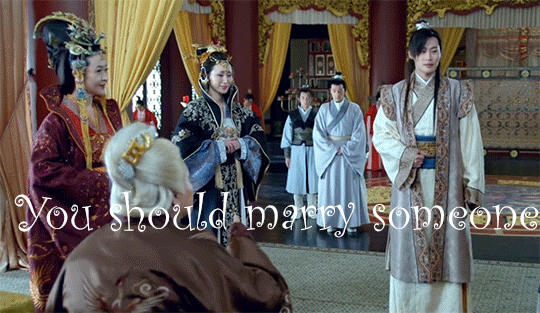
Warning: Spoilers for All 54 Episodes!
A Cunning Plan
Let's start by checking in with the in-progress schemes. Nirvana in Fire features many, many overlapping schemes that stretch across multiple episodes.
Princess Nihuang's Marriage: Princess Nihuang is betrothed to a dead guy, and that's fine with her. If she needs tender emotional care she's got Xia Dong. Xia Dong is married to a dead guy so this works well for both of them.
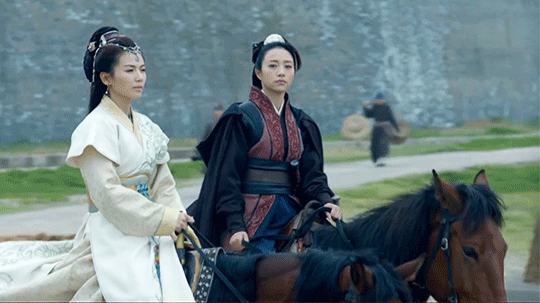
The Emperor wants to marry Nihuang off, because she's got a loyal heap of troops at the southern border, and he's a paranoid old fuck, who doesn't like anyone to have the power to overthrow him. Marrying her will sort of force her to hand her troops off to her impulsive younger brother, or something.
The Emperor has a soft spot for Nihuang, however, so he's allowed her to set a bunch of impossible conditions on the marriage, including a martial arts contest. NIF is a hybrid palace drama and Wuxia drama, so there are courtesans and backstabbing and sneaky maids and sneaky eunuchs but also, people can fly.
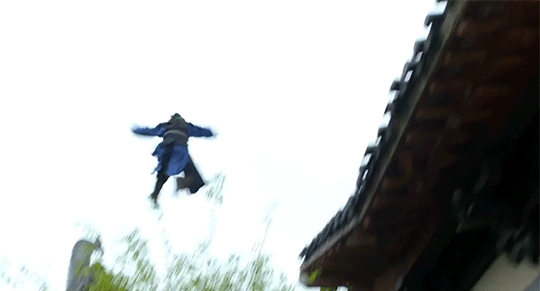
The two main power seekers, Prince Yu and the Crown Prince, have flunkies that they want Nihuang to marry, but their flunkies suck at martial arts, so if they want her to marry one of their dudes, there will have to be cheating.
Note that Nihuang's good friends Jingrui and Yujin are taking part in the contest to marry her, which might be weird, except they both know she can beat their asses so they seem to just be joining in for fun & prestige.
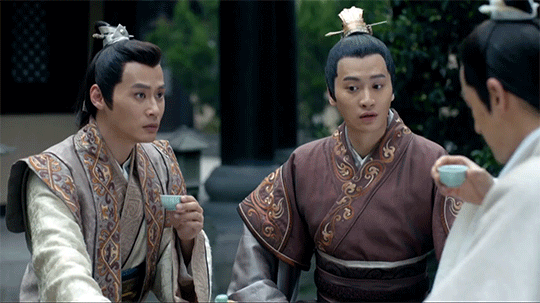
The fact that she doesn't want to marry either of these loveable cuties means that she's pretty serious about staying betrothed to her first love, despite his apparent deadness.
(more after the cut!)
Recruiting Mei Changsu / Killing Mei Changsu: Team Prince Yu wants to recruit Mei Changsu. Team Crown Prince wants to recruit him or kill him, if recruiting him doesn't work.
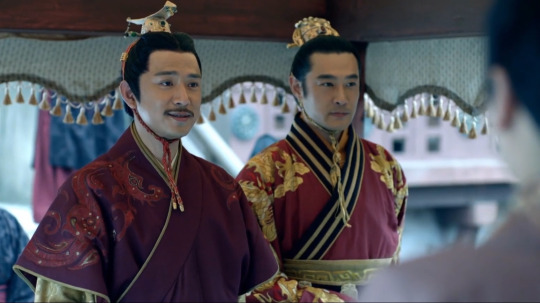
Mei Changsu acts like this is so tedious; all he wants to do is rest. But they only want to recruit him because he and his pal Lin Chen made them believe he is the answer to their problems. Whenever Mei Changsu acts annoyed at something, it's probably something he actually orchestrated. "Pork chops again?" (secretly buys more pork chops).
The Duke Qing/ Landgrab Case: In Episode 1, the Jiangzuo Alliance protected some witnesses against Duke Qing in an enslavement/land grabbing case. It's difficult for me to find anything about historical land grabbing in China because Google is full of 21st century land grabbing information. Anyway Duke Qing works for Prince Yu, so the witnesses are (whether they mean to be or not) on The Crown Prince's side. The Emperor has an interest in this case, because land grabbing is bad, apparently, even by corrupt-emperor standards. Xia Dong is in charge of investigating.
The Chiyan Army Case: This is the big conspiracy that the entire show is about. 11 years ago, the Emperor received evidence that Prince Qi, Lin Xie (Mei Changsu's father), and the entire Chiyan army were going to rebel. This was supposedly reported by Xia Dong's husband, Nie Feng, before Lin Xie supposedly killed him. The emperor ordered executions for everybody.
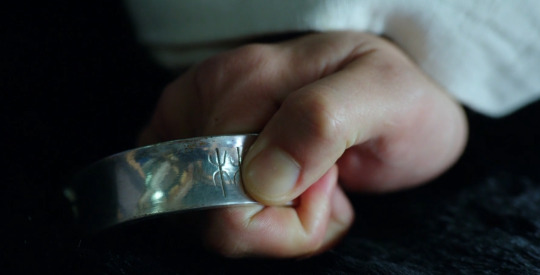
Prince Jing thought this was a bunch of bullshit and didn't hesitate to say so, which got him sent off to distant regions to do army things for years at a time, and landed him a place high up on the emperor’s shit list.
The Hazelnut Pastry Scheme: This is a small scale, benevolent scheme, in which Concubine Jing will eventually stop making cookies with hazelnuts in them, because Mei Changsu is allergic to them.
Ok, that’s the scheme roundup for this episode. On with the show!
Everybody Was Kung Fu Fighting
After a quick expository chat between the Emperor and Gong Gao, laying out the reasons for the Nihuang Marriage Scheme, we go to Prince Yu’s place to watch superhot Meng Zhi, commander of the emperor's guards, whip some ass. Not, alas, literally. Despite his leather shoulder thingies and his handsome beard, and his commanding ways on a battlefield, when it comes to interpersonal relations he is pretty much a labrador retriever puppy in human form.
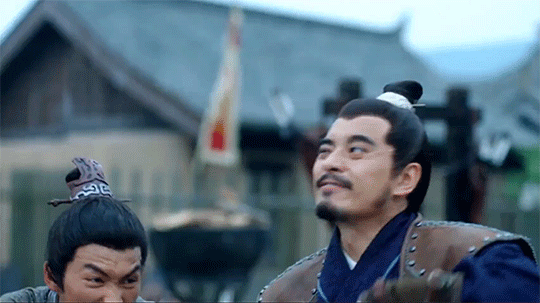
Meng Zhi is kicking the asses of Prince Yu’s fighters to determine if they're qualified to compete in the Marriage contest. They are not. He points out to the Prince that they can't put such terrible wimps into the competition because it will make the country’s defenses look weak.
This beatdown is observed by Prince Yu and by Xie Yu, who Prince Yu thinks is on his side. Xie is 100% on the Crown Prince's side, but is carefully hiding that fact; he has his son working for Prince Yu as part of his cover.
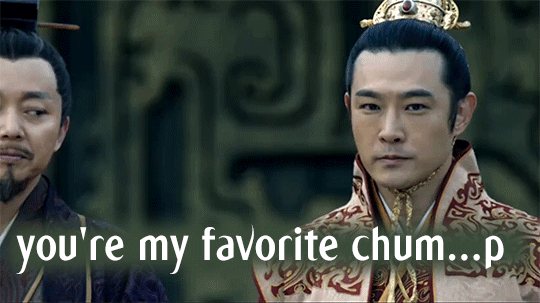
In determining how severe an ass kicking is, everyone talks about how many moves it takes to defeat someone, like it's chess. Meng Zhi can beat literally anyone else in the show. He's number two on the Langya List of fighters & we never meet #1.
Fe Liu Was Fast as Lightning
Mei Changsu is hanging out in the garden at Xie manor while Fe Liu jumps around. Fe Liu wants Mei Changsu to play Roblox with him, and pouts when MCS opts for staying in the garden and reading a book.
Fe Liu is utterly devoted to Mei Changsu; I really love their relationship. Fe Liu’s backstory isn't fully explained in the show, but apparently he was raised from an early age to focus on being extremely lethal, and didn't spend much time learning to talk or other skills, making him the epitome of the asynchronous/ gifted teen. Mei Changsu isn’t who raised him to be like this; MCS and Lin Chen rescued him, which is why he is now Mei Changsu’s personal murder pet.
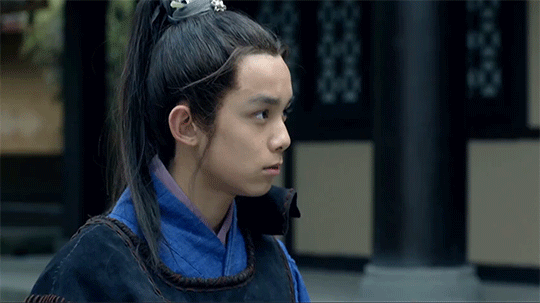
Fe Liu is both a complete fantasy character and also a really believable teen, beautifully acted by Leo Wu, who DMBJ fans know from Tomb of the Sea, and who Xiao Zhan fans know from Battle Through the Heavens.
Fe Lui promptly gets into a fight with Meng Zhi, who's visiting Xie manor. All Fe Liu was doing was leaping about the rooftops like an assassin, but since Xie Yu is the sort of guy that a lot of people would like to kill, Meng Zhi doesn't think this is so good. They have a hilarious, entertaining fight with many, many wire-assisted moves.
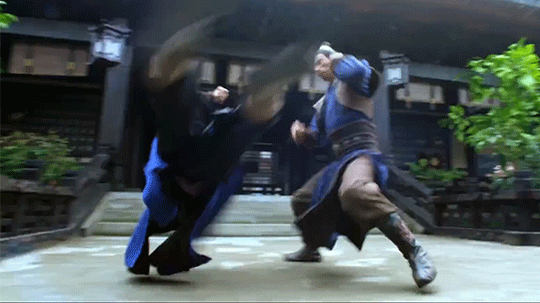
They're pretty evenly matched, and Xie Yu watches them with extreme interest until Mei Changsu shows up and tells Fe Liu to stop. Xie Yu is watching because he needs to know how many dudes he should send to assassinate Mei Changsu. Answer: more. Always more.
Unfortunately, (or fortunately since it’s probably all part of MCS’s plan) Fe Liu's extreme skilz make it obvious that his boss is someone important. Mei Changsu discusses this with Jingrui and Yujin in an open-air setting where Jingrui's brother Xie Bi can totally hear them. In no time flat, father and son have reported his identity to their respective princes.
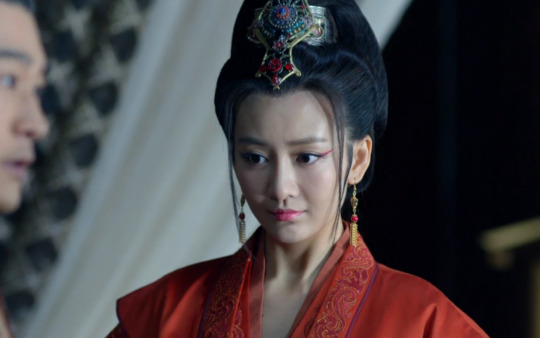
Over at Prince Yu's place, Qin Banruo and her awesome eye makeup join the party. She's Prince Yu’s advisor/manipulator, working for the (fallen) Hua kingdom, led by the (deceased) Princess Xuanji . She has a network of spies who work for her, that she deploys for Prince Yu's schemes. Her ultimate goal is not to help him, however, but just to fuck up the Da Liang Empire, which conquered the Hua.
(Nearly) Everybody Hates Jingyan
Xia Dong heads out on her assignment in the Land Grab Case, and Nihuang goes to see her off. They talk about gender expectations and how annoying it is to have to marry a dude, and briefly hang out being WLW goals with their mutual devotion, excellent fashion sense and deadly fighting abilities. Nihuang, in particular, wears the prettiest things and also stands at attention like she's commanding an army; I adore her.
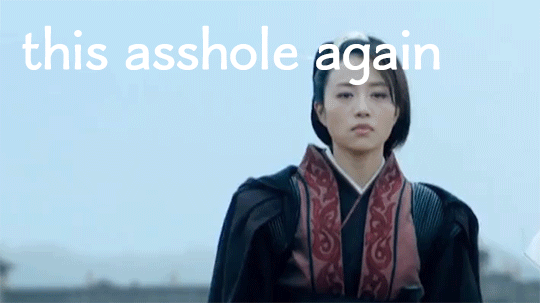
They're interrupted by the arrival of Prince Jing, who is greeted cheerfully by Nihuang and eye-rollingly by Xia Dong.
He's wearing an awesome brass-and-blue armor that we never see again after this episode. It's too bad - it's a good color for him and it has a cool vampire cloak with a high collar.
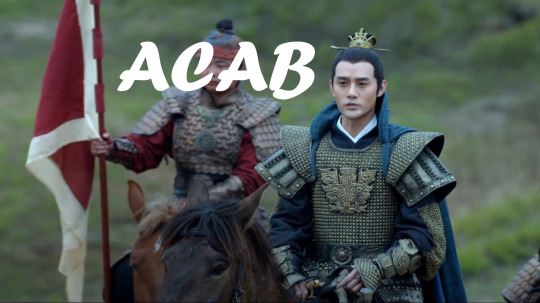
Prince Jing takes the opportunity to snark at Xia Dong about her investigation and the Xuanjing Bureau’s penchant for inventing finding conspiracies, and then rides off before she can reply.
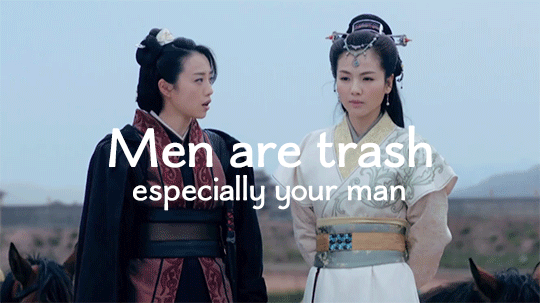
This leads Nihuang and Xia Dong to get into their chronic argument about the Chiyan Conspiracy and the Lin family, and then Xia Dong hits the road.
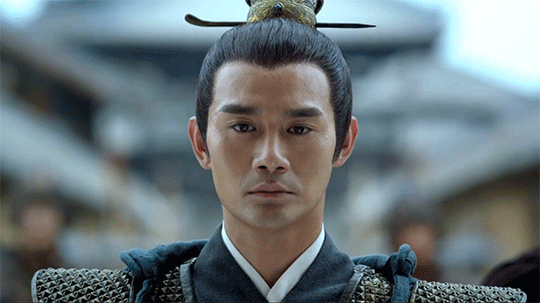
Prince Jing and his subordinates stand around outside the palace waiting to report to the emperor while the emperor ignores him. They get sweatier and sweatier while they wait. which makes me like the Emperor a little bit more.
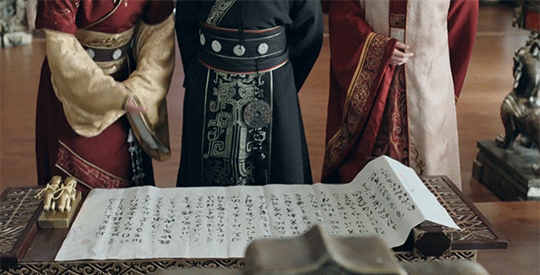
Prince Yu and CP Xian are busy sucking up to the emperor as they look at a manuscript. They are a bunch of assholes and you can see that Gao Zhan isn't a fan of this bullshit.
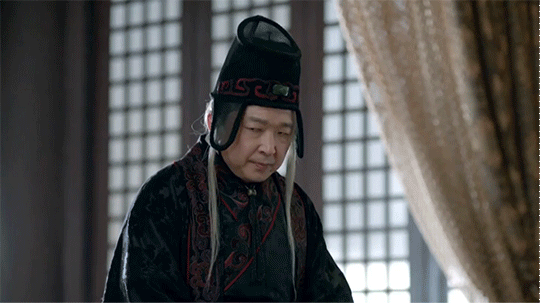
Eventually Gao Zhan reminds/persuades the emperor to summon Prince Jing, whose brothers snark at him like a couple of 12 year old girls while he radiates manly vigor and handsomeness.
Consort Jin is bummed that she can't see Prince Jing for another 5 days, and her maid sidekick says random comforting things. This maid, Xiao Xin, is actually a little snake, who works for Qin Banruo's network. We don't learn that until sometime later.
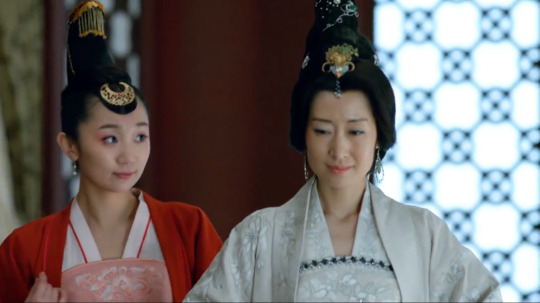
All of the maids have this same hairstyle. If you are a westerner and you think this hairstyle is crazy, have a look at some Roman and Byzantine historic hairstyles. I'm not saying this hairstyle is NOT crazy, mind you; just that crazy hair was a feature of many, many historical empires.
Consort Jing has someone deliver her hazelnut cookies to Prince Jing; she doesn’t know about Mei Changsu yet so hazelnut is still on the menu. Nicest mom. Also smartest, helpful-est mom, as the story develops.
Suck-Up Contest
At Xie manor, Xie Bi tries to get Mei Changsu to go meet the Empress, who has stopped by with Nihuang specifically to meet him, as part of the Recruit Mei Changsu scheme. Jingrui says nope, fuck that, he's not going to be a pawn in your political games, fuck off. We get to see Jingrui being steely and righteous, which is both cool and hot. Nihuang should totally marry him.
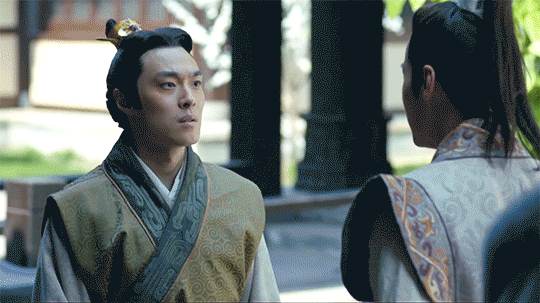
The Empress is annoyed that Mei Changsu doesn't show up, and Nihuang is like, it's ok, I don’t actually give a fuck about meeting new men. But I did want to meet his murder puppy Fe Liu.
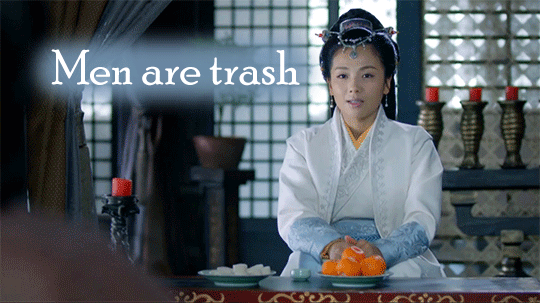
Grand Princess Liyang says they don’t need to bother meeting pugilists, despite her son being one and her supposed best friends/co-parents also being pugilists.
Grand Princess Liyang will probably be glad Mei Changsu didn’t come to her little party, once she realizes what tends to happen when Mei Changsu comes to a party.
Then we go to the suitor tournament, in which everyone more or less sucks.
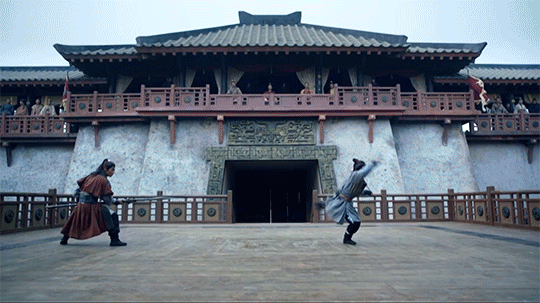
The princes really want to go over to Mei Changsu’s balcony to meet him, and they have a hilarious silent interaction where they both try not to be the first one to move. They finally cave, and go together.
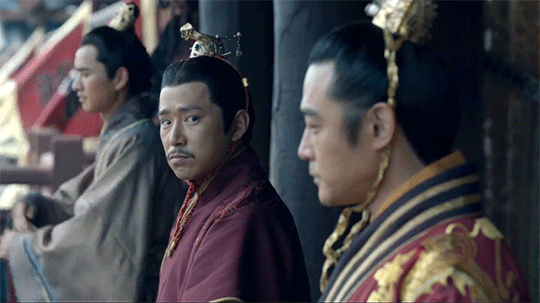
Then they compete to see who can be the most cringe and blow the most smoke up Mei Changsu's ass.
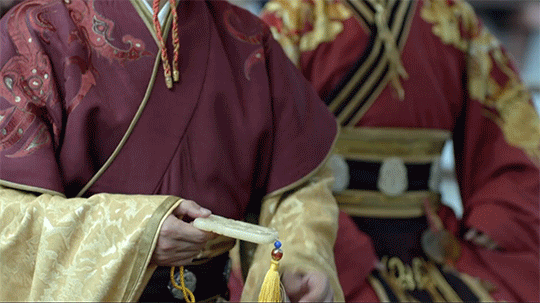
They ply him with gifts and flattery, which he mostly manages to resist.
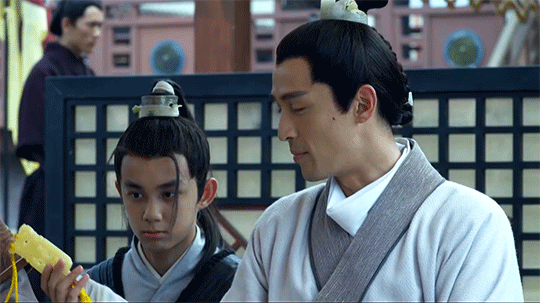
Cookie Time with Granny
Then they get summoned to go meet the grand empress, who is (I think) the mother of the previous emperor, the grandmother of the current emperor, and the great grandmother of basically every highborn character of the current generation, including Nihuang and Yujin, although it’s not clear where they sit in the family tree. Historically, cousin marriage - particularly of maternal cousins - was no big whoop in China, so it's not surprising that a lot of nobles would share a great-grandmother.
The Grand Empress is a sweet lady with dementia. She can’t figure out who the hell anyone is. First-time viewers feel the same way.
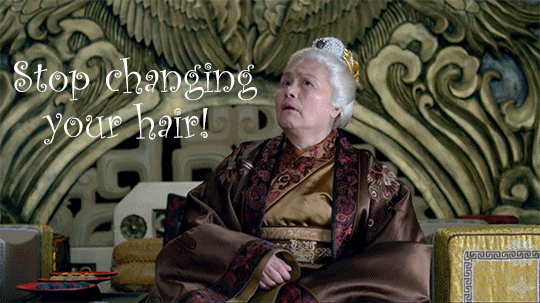
Her dementia is pretty well depicted, unlike a lot of TV dementia, or at least it matches up to my experiences with my own elders. She remembers the distant past more vividly than recent times; when she understands who’s in front of her she connects with them emotionally, but she falls off track easily. And she projects the identities of people she misses onto people who are around her.
Like many other grannies, no matter who is visiting, she wants them to 1. get married 2. produce offspring 3. eat something, you’re so skinny
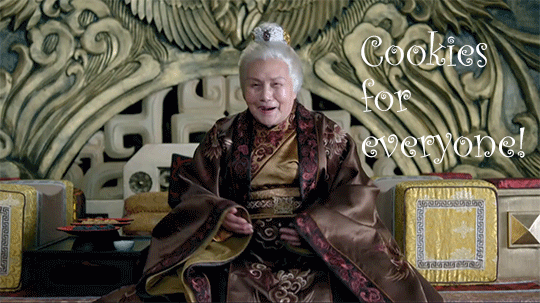
When Mei Changsu meets Granny she immediately calls him Lin Shu, either because she recognizes him or because she really misses Lin Shu, or both. She calls Nihuang over and joins their hands, and Mei Changsu grabs onto Nihuang's hand and holds it for a while.
Everyone thinks it's adorable that Granny has dementia and is confused about that guy who was horribly killed, except Nihuang, who was already checking Mei Changsu out and is somewhat verklempt. She might have to revise her anti-man feelings a little bit.
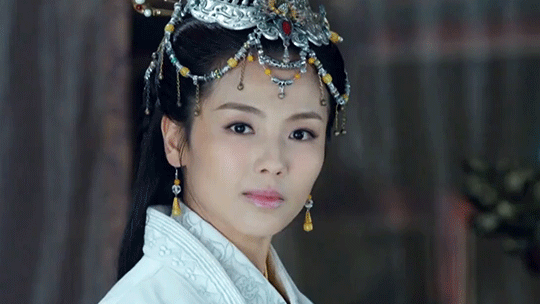
Everyone leaves, and Nihuang hits up Mei Changsu to take a walk with her, casually mentioning that she could have his hand cut off for touching her, but since she's not in the mood, he's ok.
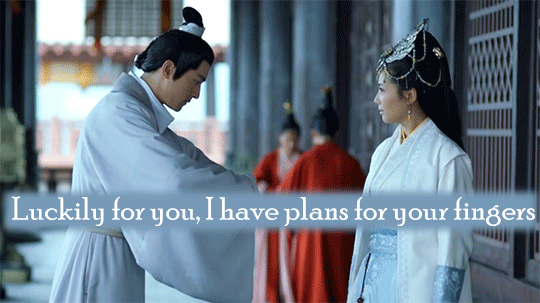
She prods a bit to find out what he's doing in town and what he's up to. “Do you have a girlfriend? Like a serious girlfriend or just a stalker who works for you?” She asks him which of the two princes he's going to support, but they’re interrupted by a eunuch beating a slave child. That’s the price you pay for trying to have a date in the palace, I guess.
#nirvana in fire#langya bang#nirvana in fire gifs#restless rewatch nirvana in fire#canary3d-original#my gifs
100 notes
·
View notes
Note
What would a spider man: life story look like for the shadow?
Now that I've actually read Spider-Man: Life Story I can give this one a response. I'm gonna obsess about this question for a while because man what a ride Life Story was.
To those not in the know, the premise of Spider-Man: Life Story is: "In 1962, in AMAZING FANTASY #15, 15-year-old Peter Parker was bitten by a radioactive spider and became the Amazing Spider-Man! Fifty-seven years have passed in the real world since that event — so what would have happened if the same amount of time passed for Peter as well?" and basically it tells the story of Spider-Man as one continuous narrative spanning 57 years, from his beginnings to a potential future, allowing Peter Parker and his cast and world to age in real time and factor in elements from the character's major stories over the decades.
And it's got a lot into it that the premise doesn't convey and there is no way I can even begin tackling a project like this for the 90 goddamn years of The Shadow's history without seriously just writing an entirely different fanfic continuity (and I already have 5, plus multiverses, possibly more) and tipping off way too much about my own plans for the character. Even I have my limits.
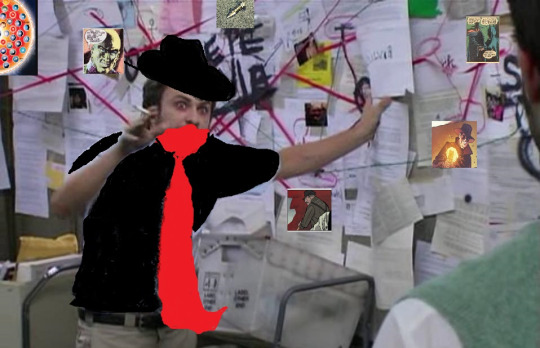
So instead, what I'm gonna do is go over the broad strokes of The Shadow's history as it would look like if you could try and condense it all under a consistent narrative, if you could focus on each decade's highs and lows, what kind of story would arise if a deranged Shadow maniac like me were to try and build a basic skeleton for a The Shadow: Life Story story.
Basic rules first: I'm sticking to the idea of Life Story and spanning every decade from the beginning of the character's life to the end of it. The aging and death parts are important so I’m sticking to those. The character's canonical birth date is 1892, so he's not making it intact to the 2000s. We're capping this off in the 90s, although it doesn't mean no further stories can be told. I will avoid mentioning specific historical events like Vietnam and 9/11 for this post to instead focus on The Shadow's trajectory. I will also not be including other characters, only somewhat referencing whatever aspects I deem relevant. I'm not sticking to any continuity, I'm pulling literally everything I can for this one
And putting this one below the cut
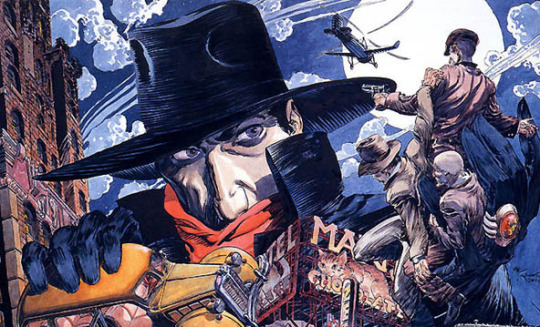
The 1930s: The golden years. In 1930, after a long line of life experiences in the Great War and traveling around the world under dozens of names, the man formerly known as Kent Allard has taken to fighting crime in the Great Depression. This chapter would be more of a standard narrative showcasing the trajectory of The Shadow's 30s career, how he's started off as a urban myth fighting gangsters and then progressed to urban avenger with dozens of allies fighting spies and supervillains. Despite being in his home element, he is restless. Another war is on the horizon. We gotta know where he starts, to get a clue of where he's going.

The 1940s: Despite it being the "family friendly American hero" Shadow era, shit gets very, very chaotic in the 40s, way more so than The Shadow could have anticipated. The pulps were relatively tame for this period, by this point instead you have the radio with it's constantly rotating writers and sensibilities, and comics that had far less reservations about either being really boring or really wacky. Far more encounters with the supernatural than before and with supervillains like Devil Kyoti and Monstradamus and Solaris, plus Khan is still around. The Shadow is forced to spend a lot more time traveling the world to deal with the war, spending a prolonged period establishing headquarters in Japan to aid Japanese underground organizations opposing the military. The agents perform rescue missions on concentration camps, and this is the period where you could have the "real" Lamont Cranston start filling in for The Shadow a bit while he's overseas.

There's a particular blurb that got released during this period that explains The Shadow acquired the power to cloud men's minds not by training, but by journeying to Tibet in an unrecorded adventure that forced him to beg the monks to grant him assistance in saving the world. I have some very mixed feelings on this whole backstory but I think there's something to this idea. Some shit went down in the 40s that was way beyond what The Shadow could have anticipated, and to protect the world from it he had to tap into forces that perhaps should have been left untouched.

The 1950s: The Shadow has dissappeared from America alltogether. He gathered up his agents and announced he wouldn't return for at least a decade, and left them with enough money to last a lifetime and retire should they feel like it. Burbank and Cliff Marsland dissappeared with him, and this chapter would probably be told from the Agents's perspective as they face the 50s while we get snippets from Marsland on what The Shadow's been up to. Some of it involves The Shadow helping protect Tibet after Mao's takeover of China. The real Lamont Cranston doesn't put on the costume anymore and instead operates as a fairly regular detective, although he's training on the skills and powers he's picked up overseas. Whatever fantasy madness haunted the 1940s is all but gone.
The 50s had basically nothing in Shadow content other than the last legs of the radio show, which are 200 episodes from 1950 to 1954 that currently don't exist anymore outside of a few scripts. During this time, The Shadow's sole appearence in US content was a parody in MAD Magazine. Overseas however, there were original Shadow novels published in Norway (a story for another day), as well as a Mexican radio and film series, which also featured Cliff Marsland. I have little information on either.
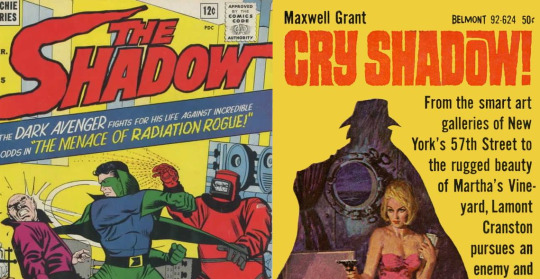
The 1960s: The OG Shadow is still embroiled in conflicts overseas, but the rise of the criminal organization CYPHER forces him to mobilize Burbank and agents old and new alike to deflect CYPHER away from where he's at, although most of them have retired by now. He still cannot return, but he has been secretly instructing Lamont Cranston on furthering along his own latent abilities if he intends to take over in his stead, and Cranston's powers have grown and developed to a point that, although he is pushing 60, he is able to do things even the original Shadow could not. He also invests a lot in merchandising and costume changes, which...doesn't pan out. Nothing in this era really pans out. It's just a really, really frustrating period of bad luck and supervillains that the aging superpowered detective Cranston is able to stop. Lamont Cranston seems to die in this decade.
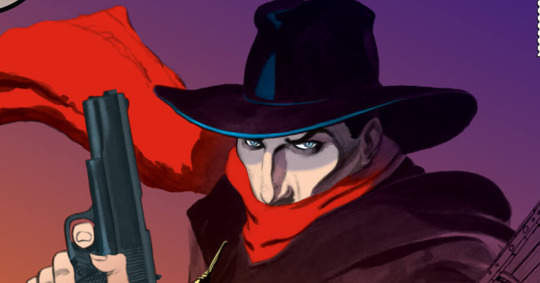
The 1970s: Inspired by The Shadow's DC series, and most importantly Michael Kaluta's spiffy redesign.
The original Shadow returns to a crime-torn America, intent on starting anew, and sets to rebuilding his network. But something is off about him. He's leaner, meaner, less compassionate and trusting. Just as what happened the first time he returned to America following years abroad, what happened in his sojourns overseas has fostered something inhuman in him, another sacrifice of his own identity for the sake of a world where the weed of crime has only proven more insidiuous. His powers have grown and so have his resources, but despite that, he's bordering on 80 years old by now, and cumulative trauma deep within his bones hampers his effectiveness. He's doing a lot better than he should, by any rights, but he can't keep this up and he knows it. And so, as before, he starts planning for it.
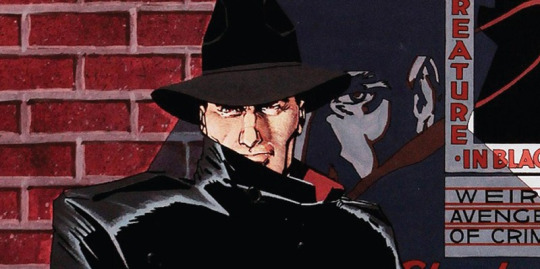
The 1980s: This was the decade where Walter Gibson died with his final Shadow story incomplete, all the movie plans from the 70s were canned, and Howard Chaykin happened, plus the other DC runs. It's the SHIT decade, basically, where everything goes to hell. Whatever plans The Shadow had blew up, dipshit copycats start ruining everything, his network crumbles, and this is probably the ideal decade to kill off Kent Allard.
But this is also the decade where something weird started happening outside of the story: The Ghost of Gay Street hauntings, where visitors on the hotel Gibson wrote the stories in repeteadly claimed to see a ghostly visitor looking exactly like Lamont Cranston, and Gibson himself claimed that to be a tulpa he created by accident.
Kent Allard may have died. But death can never claim The Shadow.
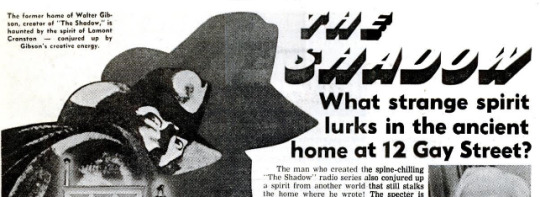
The 1990s-onwards: Somehow, The Shadow is still active. Still elderly, in a much more limited fashion, but still as sharp as ever if not more so. His powers have grown more so than ever before, even blossoming into a limited form of telekinesis. Is he a ghost? Did he somehow survive the events of the previous decade? Somehow, both Lamont Cranston and The Shadow linger on, but is it Kent Allard or Lamont Cranston? Is it someone else?
Who knows?
This is the decade in particular where he's going to be interacting with more prominently with a new generation, whether it's descendants of the original agents, or new heroes that have found themselves in his orbit. Inspired mainly by the Dark Horse Shadow comics, Ghost and The Shadow, and Peter Straub's Mystery and modern takes on the character like Batman x Shadow and the 2017 mini that play up the miserable immortal and ghost teacher aspects, also inspired by my recent realization that The Shadow's ideal future in-universe may be getting to age and mentor the next generation in some capacity.
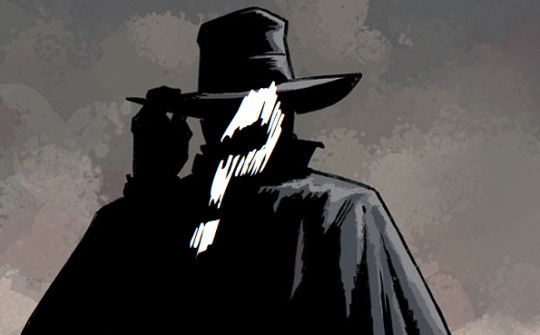
Anything beyond that, only The Shadow Knows.
#replies tag#pulp heroes#the shadow#pulp fiction#visual art#comic books#lamont cranston#kent allard#spider-man life story
17 notes
·
View notes
Text
I started thinking about one of Muffin’s posts and it got me thinking what I would do if I, myself, was asked the question: What would happen if you were sent back and ended up in the orphanage with Tom Riddle—and say you also had magic?
Now I’m going to diverge in interpreting the ask and answer the question assuming it means I get inserted from the start, from when I was born. I have no knowledge that I’m in a self insert and I retain no current knowledge of my real life. I’m making this change because I think the concept, for my particular case, is more interesting this way.
You see, being someone who was internationally adopted, I have in real life, if I may say so, an awesome premise for the beginning of an urban fantasy story of my own. For context, I was born when China’s one child policy still was a thing, and I’m one of the many “lost girls”, if you will. What my parents were told was that, as a few days old infant I was found on the side of a street by the orphanage owner’s daughter, with no identification except the date and time of birth written on a slip of paper. The orphanage was under construction so I was transferred to foster parents until I was adopted by Americans when I was 1 years old.
So to modify it in a Harry Potter self insert, I will keep my birthday, gender, race, and personal quirks (appearance, personality, abilities and interests) the same. In addition, the how I was found as a days old infant by the orphanage will be the same, just the where will be London, England. I haven’t checked to see if this would be possible historically speaking, but oh well. I will have Me be the same age as Tom.
So I’m raised from infancy at the orphanage. Yeah, I in real life was a little bit maladjusted (hence all the child therapy) from just one year with caring foster parents. I would without a doubt be hella mentally unstable in this scenario. Oh, I’m sure there would be some nasty incidents of my own.
I expect I would be one of the only Asians at the orphanage, so I would feel pretty different from the others. Oh yeah, and the racism and sexism won’t help. I think it’s fitting if I had a decent control over my magic, but the best I could do is mediocre level stuff. I think Tom and I would consider us similar in that we both can do magic. I would be quite envious that Tom was better than me, and I’d consider him a rival.
And yes, Dumbledore would probably meet us at the same time to save him the effort of doing it twice. We would both initially assume he’s someone bad, with me probably thinking he’s from immigration control. We would both ask if he knew who our parents were. We would both tell him we could go to Diagon Alley by ourselves, individually of course, without him.
I think I would spend a little while under the hat. It would tell me I would fit right in with Slytherin (because of my antisocial mindset), I would do well in Ravenclaw, and that I’d be happiest in Hufflepuff (though I would have work to do regarding my mental health). In the end, I’m put in Slytherin. Throughout my school career, I expect I would be a great student and a proficient witch, but again, I’d be envious that Tom is proven to be smarter and more talented than me. I’d imagine I would be in the Slug Club, with Slughorn considering me and Tom as a set novelty pair, very vocally letting us know he ships the two of us together. We both would resent it. So, naturally, I’m therefore picked as prefect along with Tom.
Oh, and I would be terribly frantic to find anything at all about my parentage. I would secretly look up Tom’s as well because I’m clearly obsessed with comparing myself to him. I would be so absolutely fucking furious that Tom has, not just a still-living father, but is also a goddamn direct descendant of Salazar Slytherin. While me, I find absolutely nothing. This would be the last straw for me, and I would have a mental breakdown too. Here on, I do everything in my power to ruin his life. So when Tom opens the chamber of secrets, I figure out it’s him, and you bet I rat his ass out. I even get Dumbledore on my side.
What happens next?
7 notes
·
View notes
Text
what the world will look like when it’s over
Can’t Get You Out of My Head is the first Adam Curtis documentary I’ve seen. I gather it’s not the most successful demonstration of his method; it sounds like Hypernormalization or The Century of the Self are tighter in their construction, less effortful (count how many times Curtis says something like “But then it started to run out of control” in this one), and perhaps less frustrating in their narration. In the early episodes of this documentary in particular, it feels like Curtis is constantly presenting what’s being covered as the turn, the decisive shift in his narrative—the emergence of the American counterculture, the revolution of the “unit of One” led by Mao Zedong’s wife Jiang Qing to help her break the stalemate with the other revolutionaries in China into which Zedong had fallen in the 1960s, George Boole’s development of Boolean logic to describe human thought. And the whole thing feels longer and baggier than it needs to be. The early episodes devote much time to interesting individual narratives, like that of the Trinidadian British activist or sorts named Michael Freitas (or Michael X) or a trans woman named Julie in 1960s Britain; they also sprawl in a way that makes the overall argument a bit hard to divine. It’s not until the fourth episode that the shape of Curtis’s narrative becomes clear—that our age is the product of a struggle between a new, broadly liberal-democratic and capitalist image of individualism, a dying era of collectivist struggle, and older, more vicious systems of power, derived from the control of capital and expressed through the middle classes’ suspicion and viciousness toward the subaltern and toward each other, even as they remain subject to the power of oligarchs and billionaires.
Curtis also seems to play fast and loose with the facts sometimes. When he presents Médecins Sans Frontières’s founder Bernard Kouchner as an avatar of a theory of the “one world” of liberal democracy—the idea that we’re basically one world of individuals, enjoying certain human rights regardless of political orientations or ideologies, and that Western nations are duty-bound by virtue of their prosperity to intervene when other nations violate people’s rights—it seems a distortion of what Kouchner actually says in the footage Curtis includes: “We don’t care on leftist or rightist countries [sic]; there is no leftist and rightist suffering, and there is no possibility to split the world in[to] ‘good’ people or ‘bad’ people, ‘good’ dead and ‘bad’ dead.” Which isn’t to say Kouchner didn’t believe in liberal-democratic ideas—he may well have—but what he’s shown as saying has to do with the consideration of suffering as suffering regardless of a person’s identity or allegiance, which is a different matter.
This is just one of several moments when I stopped to wonder how secure I actually was in Curtis’s hands. But ultimately, I find the emotional history he lays out resonant. The age we’re living through now, in the 2020s, is indeed the product of certain fantasies of individualism and of a post-end-of-history, neoliberal “one world”—with no ideologies but capitalism and putative democracy—meeting age-old systems of power, acquisition, and control, and age-old features of the human mind and heart: resentment, prejudice, betrayal, jealousy, the need to be prosperous, the need to be free.
And Curtis’s work appeals to me for the same reason the writer Pankaj Mishra’s work does. He historicizes our underhistoricized time. What’s more, he does so in a way that’s especially rare to see in any mainstream media venue. Usually, when you want to understand the connections between, say, colonial-era empires and post-war welfare states, or if you want to understand what happened to turn Western societies as they were post-war to Western societies as they are post-financialization, you have to seek the information out on your own. It’s valuable to have someone in a place like the BBC willing to put the pieces of these narratives together. And willing to remind us of the events that are so incredibly easy to forget even in one’s own lifetime. Abu Ghraib, for instance, which pops up in part 6 of the documentary. That shit happened while I was alive. How often do I remember it? How many American sins get drowned out in the new ones that emerge every day of every month of every year? Or in the stasis that sets in when what was once novel, like the War on Terror or the invasion into our privacy represented by the Patriot Act, fades into regular life?
I was jotting down copious notes while watching the doc, as is my wont. The questions and thoughts that came up, in no particular order:
How do the elites of a given era impose their preferred ideologies? How are the structures of power we grow up with constructed, and how do those go on to shape our behavior?
Control, as it’s practiced by societies in the 21st century, often comes down to the recognition of patterns in human behavior—and their manipulation.
The loss of power, like that which was suffered after the collapse of Britain’s empire or in the slow hollowing-out of America’s manufacturing industry in the 20th century, leads to anger and melancholy that people can’t be expected to abandon. Does doing what you’re supposed to do bring you the happiness you were promised—or anything even resembling that happiness? When we’re living in a historical moment in which the answer is no, as is often the case today, we’ll need to watch out. It’s a sign people are being manipulated and abused.
Over time, the tech industry has come to understand that you can manage people en masse by collecting their data and manipulating the messages they receive in social media activity feeds and advertising—and you can make them feel like sovereign individuals at the same time through the very same means. In light of all this, will there ever be a revolution that actually changes the structure of power we’re currently stuck in? Is there a chance to alter this extreme individualism. on the part of people who are surrounded by political systems so enervated, by the supra-governmental system that is global finance capital—which politicians can’t control, and must appease and palliate—that they can’t respond to phenomena like climate change or meaningfully punish atrocities like wars prosecuted on false pretenses? Or are we stuck where we are, in a world that’s corrupt and exhausted? In nations whose governments depend on technologies of surveillance and myths of consumerist abundance or nationalist glory to maintain power, in the absence of any real vision for the future?
It all leads to some interesting takeaways. For one, the way culture reacts to politics and vice versa. As I was watching Can’t Get You Out of My Head, I was reminded of a conversation folks on the Discord server for the Relentless Picnic podcast had had recently about the strange things Richard Dawkins posts on his Twitter account. And it led me to think: when religious “caring conservatism” was in the White House, Richard Dawkins and his New Atheism, this brash repudiation of religion and its pieties, grew as a counterweight. When Obama and his technocratic regime were in power, with social media bringing on a wave of progressivism in popular culture and algorithms presenting us a fantasy of endless choice—much of which was a thin veneer over the same old shit: banks getting bailed out, forever wars going on, productivity rising while wages stagnated—we also got Jordan Peterson-types who claimed to speak to a human need for narrative, even in this point of stability we had seemed to reach, this recovery of sanity after the chaos that was the Iraq War and the financial crisis; who claimed we needed ideas and myths to animate and drive our lives, because they sensed there was something hollow and mendacious driving all this consumer choice, for all it seemed a symbol of our freedom and progress.
Of course, both Peterson and Dawkins are provocateurs, not intellectuals; I don’t mean to dignify the movements they led much, since in both the appearance of intellectual rigor or moral clarity often covered the indulgence of the worst instincts: immaturity, obstinacy, provocation for provocation’s sake, contempt for women and trans people. The New Atheists had a point, and could be absolute assholes about it; they ultimately could be as fundamentalist and dogmatic as any religious people. As for Jordan Peterson, his actual work, in the way of so many grand theorists, uses the appearance of profundity to cover something ultimately pretty banal. And he’s most known for grandstanding in the public sphere—refusing to use people’s pronouns, the usual conservative shit. But these movements do seem to reflect a countercultural response no less than 1960s counterculture reflects a reaction to the staid culture of 1950s America and the sins it covered up.
Which leads me to the question: what was the culture’s response to Trump’s administration? Maybe QAnon and Russiagate, as conspiracies—that is, actual narratives people inhabit to explain the world’s evils, and not just a vague need for them that they satisfied with Jordan Peterson’s light form of Stoicism or his theories of Light and Dark or whatever the fuck. And in that way, perhaps, once a countercultural movement—namely nationalism and Trumpian populism—actually seemed to have overthrown a regime, of Obama-era liberal technocratic management, culture and politics came to mirror each other, rather than standing in opposition to each other. Both became equally conspiratorial and unhinged; in fact, they merged. All the ruling myths and conspiracies mutate in kind these days: Trump’s garbage about draining the swamp, a cover for Trump and his family enriching themselves and Stephen Miller’s like getting to fashion the state they wanted, becomes QAnon’s garbage about rings of child trafficking and pedophilia and Trump, of all people, being their savior—all while actual trafficking and abuse perpetuated by Jeffrey Epstein and his ilk goes unpunished, Epstein’s death swallowed up by the state without a sound—becomes the liberal pundit class’s screaming about Russia: connections between Trump and Putin that were always conjectural to me, because no one who pled them seemed to feel much need to substantiate them.
Here again I feel like what were once centrifugal forces in our culture—between mainstream and the independent media, for example; between people in power and their critics, either in the media or at society’s margins—have collapsed into a single morass. We’re all in hell and there’s no way out.
In all this, what does Biden’s administration represent? Little more than an interregnum, to my mind. How disappointing to see not even a gesture toward forgiving student debt or raising the minimum wage in these first 100 days of his presidency. There’s been some progress in climate legislation, and progress in putting Stephen Miller’s deportation machine to a halt (though they’re also reopening several emergency shelters to accommodate more minors already being held past the mandated limits for keeping them in the custody of the Department of Health and Human Services’s Office of Refugee Resettlement). But there’s also been such triangulation on policy by the administration and its supporters and such complacency on the part of the media covering the administration, refusing to call them out on or even cover this. And how can the average voter respond but with resignation?
Ever since I read Thomas Mann’s Doctor Faustus near the start of lockdown, absorbing the picture of the world pre-World War II that’s presented in that book, I’ve thought we’re in the same sort of moment that Mann’s protagonist Zeitblom was in. There’s a crisis that’s passing over this whole planet like a wave or a seismic event, and no human intervention can interrupt it. We can only wait for it to pass—holding on to whatever’s to hand, waiting to see what the world will look like when it’s over.
#adam curtis#documentaries#thomas mann#jordan peterson#richard dawkins#pankaj mishra#the relentless picnic#conspiracy
28 notes
·
View notes